|
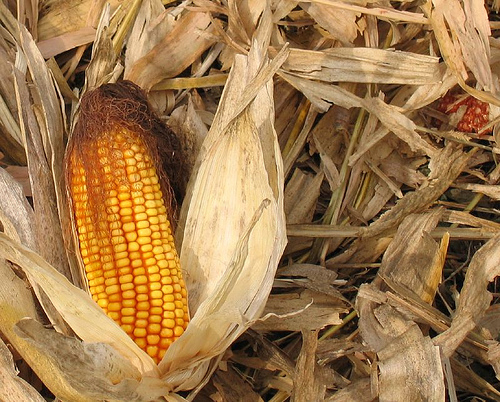
Memories of field corn as season approaches.
(*photo credit)
August 1, 2018 Harvesting and Thankfulness
Let's turn the harvest month of August into one of thanksgiving for gifts given, namely the first fruits -- grain, fruit and vegetables. The English church has a Lammas Day or "loaf plus Mass" from old English. Like other feasts (Christmas, Easter, All Saints, etc.), the day most likely substituted for a pagan feast. On August first, the Roman pagan feast became the day to commemorate "St. Peter's Chains," that is, the miraculous deliverance of St. Peter from prison. This feast originated as the dedication day of the church of the apostle Peter (S. Pietro in Vincoli), erected on the Esquiline Hill in Rome in the fourth century to venerate chain-bound Peter before his death in 64 A.D.
Thanksgiving, for the bounty that is bursting forth all around us in fields, yards, gardens and woods, is our particular theme for the month. Grain combines are now operating from Texas through the Great Plains to Canada, harvesting the wheat that is bread for a hungry world. For many in Europe, this is vacation month, a time to relax and see nature's bounty. For others on this planet, this is the time for added work in harvesting the fruits of their sowing. We often postpone our thanksgiving to after the gathering, namely to Thanksgiving Day in late November. However, August makes us aware that gratitude knows no limits, for God's gifts are numerous and embrace all times and places.
We look about and see green fields of soybeans and corn that will not be harvested until immediately before or after frost. However, August is when many American farmers fill their silos for the cattle during winter. Furthermore, the garden harvest is also peaking for a variety of vegetables, and especially such garden crops as tomatoes, beans, and sweet corn. Farmers' markets are brimming with cucumbers, melons, summer squash, cantaloupes, okra, and, don't forget, zucchini. The bounty of peaches, plums, quinces, early pears, apricots, and summer apples is worth savoring and preserving during this most bountiful month. While blackberries are generally past season, except in higher altitudes and northern climates, still this is the time of blueberries. Also in August many of the garden herbs are gathered and dried. Every effort is being made to preserve the flavors of August in some creative preservation practice.
Variety and plenty go hand-in-hand in August. Yet in drought stricken lands of Africa this is not the case. The heat overcomes the people and livestock in parts of the Horn of Africa and beyond. Our gratitude includes responsibility to share our gifts with others. The human family is not equally blessed in immediate food supply, and we who know plenty are called to share. Thankfulness and generosity are twins, and August is the time to express this in special ways.
Prayer: Thank You, Lord, for the good land that produces the food we need to sustain life; we thank You for the produce coming from that fertile land. Move us to share with others.
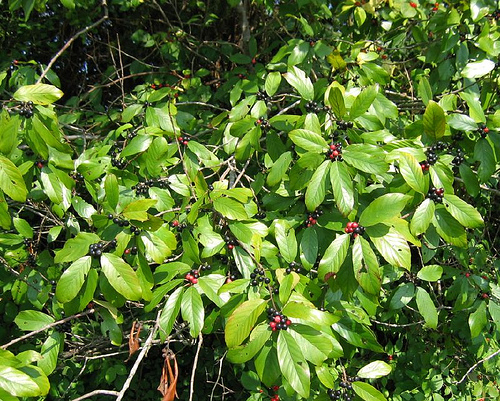
Late summer Carolina buckthorn, Rhamnus caroliniana.
(*photo credit)
August 2, 2018 Gratitude for Mid-Summer's Green
We take a walk and enjoy the intense mid-summer greenness. This August phenomenon is especially true in the Bluegrass State and at this time of year when we are blessed with normal summer rainfall. The peaking of greenness announces the changing landscape that is here but a short while. We are powerlessness to restart or halt the change, for we can't stop the flow of time. We can accept this flow and enjoy it while it lasts; that makes our thanksgiving a joyful celebration.
The countryside is verdant: fields in the full bounty of pasture and cropland, gardens, lawns, roadside greenspace, and all the trees, with the exception of the black locust, which has started to turn brown. Some varieties of trees seem to sprout fresh summer additions, which add pale hues to the sea of dark greenery. Even the farm ponds take on a mid-summer green algae growth, unless an effort is made to keep it off. Amid this intensity of color appear hints of change in the air. In a few weeks the blades of the full-grown corn stalk will turn yellow; the gardens and fruit trees will yield their fruit and the soybeans will turn yellow and the pods mature. This green landscape is now highlighted by patches of goldenrod, the purple ironweed in the pasturelands, and the subdued pink and purple of the joe-pye weed.
For farmers this is silo-filling time. Various types of foliage can be used, but we were blessed in past operations (six decades ago) to be able to use sorghum cane and green corn. We would take corn knives and cut the first two rows by hand so that the binder could come through and bind the corn/sorghum into bundles. These bundles were hauled to a stationary chopper set up next to the silo. The bundles were fed into the chopper, and the resulting sweet-smelling chips were blown into the silo by air generated in the chopping device. Our task as kids was to distribute the silage evenly. We maneuvered the delivery pipes so that the silage would be evenly distributed throughout the circular area, and we tried to tramp loose silage into place. We would relax and climb higher up the silo and jump down into the loose silage as a youthful way of packing it. As the silage piled up higher, its increased weight had its own settling effect. After filling the silo we would haul up buckets of dirt to seal the silage in place; this would cause further settling.
August was a wistful time, for we knew that vacation was coming to an end, another school year would soon start, and the freedom of summer would fade. Even when young, we knew the greenery would not last forever, and the summer crops would soon be ready for bringing to the barns and storage areas. We Kentuckians, swimming in a sea of greenery, experience the nostalgia of fleeting beauty. Still we are thankful to be able to seize the passing moment and savor its sight, sounds and smells.
Prayer: Lord, give us a sense of gratitude for beauty that is here and yet is passing; this speaks much to our life's journey.
How to Effect Citizen Confrontation
Confrontation is evident in our society, but is viewed differently by various people. The one who sees a trying situation may feel justified to face the issues immediately and forthrightly. This is a confrontational person -- someone in the minority. On the other hand, many people do not fit this category and may even argue that confrontation is unnecessary and can be avoided for a better and more gentle approach. We are all aware that some people are more confrontational than others, and regard it as differences in personalities. The confronter may be regarded by others as rare, frustrating, exasperating or to be tolerated at best while permitted to adorn the political and social landscape.
What is becoming evident to environmental activists is the world is in the midst of global change. These strongly promote a renewable energy economy that can halt the catastrophe of climate change, which is seen as evident. Activists generally seek to be part of or support a confrontational approach that directly addresses this critical issue. They rebuke the non-confrontational types who refrain from moral or financial support, because it is regarded as less than perfect. Each reader can distinguish differences among friends and acquaintances. We all know those with addictions and personal problems; some address these personal problems face-to-face and others would never opt for confrontation. However, the manner of handling political and social problems is a new ball game, and requires more social interactions; all agree that such issues are complex and bedevil the best of folks.
Confrontation as valid and necessary. Are we aware that at given times confrontation has its place in our world even while some are hesitant? Are there times when the face-to-face approach is not only valid, but also necessary? A particular need for change may be conceded to be valid, but the approach to solution may be a matter of substantial disagreement. This may be due to circumstances, style of participants or the receptivity of target individuals or groups. Furthermore, when social or political issues have an impending crisis attached, the luxury of slower approaches may be damaging and thus more direct and rapid confrontation is necessary whether at the personal, local, national or global level. The change is forthcoming, but often the seriousness requires more immediate response and confrontation.
Christ as confronting. Let's recall that at various times in the Gospels Jesus showed insight and skill at being confrontational (e.g., Samaritan woman at the well, purging moneychangers from the Temple, interaction with Pharisees on various occasions, talk with the rich young man, direct rebuke of disciples, etc.). He was corrective to the Sons of Thunder (James and John) who wanted to cast fire on the unwelcoming Samaritans when on their journey to Jerusalem. Proper manner and timing were varied and responses sometimes different. At proper times Jesus did not flinch, and he expected his disciples to stand fast in their ministry with others. However, there were times when the situation called for simple silence (Jesus before Pilate).
Confrontation and urgency. Some who do not want to be drawn into controversy or use of limited energy will withdraw in one of three fashions: they will deny the problem; they will excuse themselves as not the person equipped to answer it; or they will accept the problem and remove themselves for less pressing issues and thus escape to other matters.
Denial: We have spoken about confronting climate change deniers (our video on YouTube), for they may prove difficult to handle. The failure on the deniers’ part to accept scientific evidence does mystify those of us engaged with scientific data or research. The facts of climate change are self-evident -- or does this apply only to some of a scientific bent? The doubt is the very passport the deniers use to call for more evidence or simply to walk away and say the matter is unimportant. Part of the denial relates to the reimbursement of deniers by profit-making groups or individuals. The question facing those who see the issue in all its seriousness is how long we can endure a tranquility, which threatens the very life of our planet. Confronting the situation is a necessity; this means not accepting denial as a valid argument, but to look to ways to circumvent deniers and still achieve a new economy, which must be established now.
Excuse: Rejecting the ability to focus on the rational grounds of climate change deniers shifts the discussion to the more learned or skilled, and the unsure step away from the controversy. Refusing to accept the denial as proper moves one on to action; accepting that more argument is needed and that the denier has rational points opens the way to excusing oneself. "I know someone who can answer this better than I can." However, such an utterance opens the door to rationalize one's own withdrawal -- and, if enough people follow this course, the battle is lost without direct confrontation. The answer to the excuser is that the basic facts speak for themselves, and that the denying position is false and misleading.
Escape: Some citizens see the problem and hope others will answer it; when this is not perfectly done or with sufficient urgency, then the problem remains but the individual says, "It will disturb me to consider it further, and so my psychic health demands I withdraw to some form of relaxation." Such citizens may say their citizenship demands withdrawal from the battle and hope others can work this thing out by their skill. No doubt all of us find this argument appealing at times, but citizenship is a continuing responsibility and our delicate and responsible democratic process does not allow denial, excuse and escape.
For Christians, what one lacks in words can be made up by the power of the Spirit at work within us; we are called to see the necessity of action and entertain how that can be better achieved in our lives. Change is needed and we are called to act now.
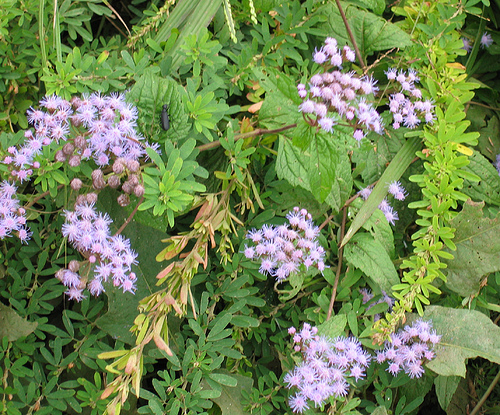
Blue mistflower, Conoclinium coelestinum.
(*photo credit)
August 3, 2018 Stay Nearer Home This Year
Sometimes we are drawn to distant places and peoples thinking that is the proper thing to do. At other times we simply want to travel less, enjoy more and stay at home and rest. During these hotter than usual times it may prove more meaningful to curb the luxuries that include unnecessary travel. Such a change may prove quite memorable; more rest and less stress go hand-in-hand.
Change the pace. Varying routine may prove more important than acquiring long distance destinations. For those who travel some distance to and from work or other activities, the one change needed is less travel by staying closer to home. For some, this "vacation" may best be achieved by simply having an unplanned week and let come what may -- for we live too often by rigid schedules. Resolve to break routine in diet, sleep habits, and exercise. Put down the electronic device and turn away from being overly connected. Ask your social media companions to do likewise.
Enjoy the uniqueness of your home place. This decision can become our opportunity to know the locality. When visiting local historic places, discover how much local treasures are worth valuing and promoting to others who think that distant travel is the ultimate pleasure. An added benefit is that doing so supports the local economy. But even better, help redefine local vacationing in a non-commercial and environmentally green manner.
Plan to be easy on yourself, especially if reaching certain destinations and travel conditions are stressful. Avoid congestion by traveling before or after the crowd has started or finished, or choose a less popular day or even time for vacation. It is not difficult for most of us to anticipate the more congested times and places when reaching the local destinations. However, even local areas are full of surprises -- festivals, anniversaries, battle reenactments, and rare popular events.
Take more time to reflect. Vacation could be incorporated into a retreat setting and situation. This can prove to be a change of routine and an opportunity to communicate with the Lord rather than always with certain friends, colleagues or partners. Vacation periods may be times to reset our direction for the better. Taking a pen and pad could come in handy for new thoughts and ideas that are worth recording.
Observe wildlife and flora. Few of us savor the good things in creation that are all about. These become our teachers and guides if we only allow them. Our appreciation of the flora and fauna is our way to spread Good News to all creation. In some ways all creatures know when we enjoy them, and they become present to us through a certain resonance.
Prayer: Lord, give me a chance to rest when and where rest is due, and to be able to achieve this without traveling great distances.
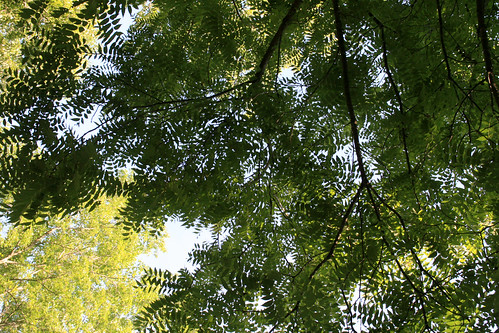
Experiencing the treetops in a walnut tree grove.
(*photo credit)
August 4, 2018 Consider Nut Tree Plantings
We are often reminded that we can reduce our carbon imprint by planting trees -- and that is satisfying. We know that Americans during the last two hundred years have contributed twenty-seven percent of the total carbon dioxide that is now in the global atmosphere. Planting trees is a way of rectifying some of the carbon burden we have imposed as consumers. Why not plant productive trees that are large enough to make a difference (too many of the fruit trees are dwarfs or semi-dwarfs)? The larger nut (and acorn) trees such as oaks give shade, often grow to sizeable heights and take up that extra carbon dioxide while providing valuable food for wildlife and us as well. An added benefit is that high grade black walnut (Juglans nigra) logs can bring high prices as well with maturity -- for they are a sound economic investment.
Besides walnuts there are other shade trees that are beautiful in shape and appearance. The American chestnut is on the road back to its illustrious place among the great shade trees of our land. Beech, pecan, and hickory in many varieties are prized trees, which offer plentiful supplies of nuts at least every other year. Chestnut wood is found in ancient barns still in good condition; hickory wood is good for smoking foods; the walnut's grain and dark color are prized for gunstocks and furniture.
Federal and state agencies sponsor nut and especially black walnut plantings both individually and in plantations and often offer seedlings at nominal fees. Young trees will bear nuts as early as six years after planting. Usually pistillate (female) flowers produce nuts after being pollinated by staminate (male) flowers of the same tree. In a very early or very late spring, the pistillate flowers may not be ready when the pollen is shed. Different varieties of walnuts have overlapping pollen-receptivity periods and can pollinate each other. Thus groves have advantages.
Walnut trees develop deep taproots and should be planted in very deep well-drained soil generally in the fall (with husks on) or early spring (with husks removed). The trees need plenty of room to grow and should be planted 10 feet apart for timber and 60 feet apart for nuts. The soil for walnut trees should be slightly acid with a pH of about 6.0. Foresters advise that soils be tested before planting. Nitrogen and potassium are especially needed by walnut trees for nut production. The new trees also benefit from the addition of manures and organic matter to the soil. Weeds should be kept away from the base of the trees to reduce competition for moisture and nutrients. Avoid planting them near garden areas (especially near tomatoes and potatoes) or most berry patches (except raspberries). Walnut tree roots exude juglone, a substance toxic to some plants -- and hickory has similar problems. Ask your county agent to suggest the best nut varieties for you.
Prayer: Lord, help us to correct the misdeeds of our past as a people by planting productive trees in our vacant landscape.
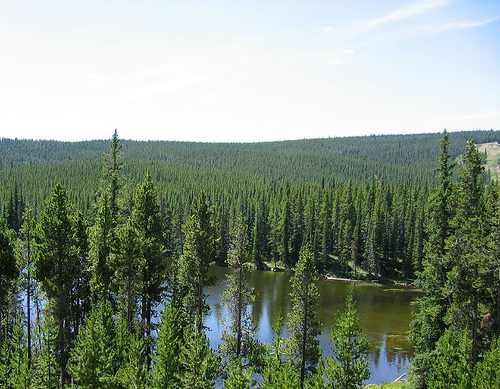
Vista overlooking peaceful lake, eastern Wyoming.
(*photo credit)
August 5, 2018 Confronting Hunger in the World
The Lord gave them bread from heaven. (Psalm 78)
Hunger, of both a physical and a spiritual variety, exists in this world. These types of hunger afflict the very poor in the first case and a cross section of population in the second. In actual fact, God is the provider of physical and spiritual bread, and God expects us to be the normal deliverers of this largesse. Certainly bread-providing miracles have occurred in history but human channels are the normal practice. Even the manna in the Sinai is a natural phenomenon that can be found today in the same desert areas in which the wandering Jewish people were directed to it at the time of the great Exodus from Egypt.
Today, with great urgency, we are called once more to deliver provisions to the needy. We become God's hands and feet at work to feed unfortunate people who will die without immediate assistance. Hunger cannot be put off and delayed. People need today's bread. God has given plentiful gifts to an entire world, and we must take immediate steps to give charity at times of drought, floods or other calamities. We must share resources that can produce either adequate food for all, or resource-intensive foods (animal products and prepared foods) for a privileged few. Furthermore, we must ensure that cropland is used for food and not for renewable fuels to move wasteful vehicles. And finally international assistance should support small farmers to enable them to feed their own needy populations and have seeds, fertilizer, tools and access roads.
Our concern about global physical hunger should not diminish an equal concern about the spiritually deprived: the people sated with allurements of every sort and overcome by despair and helplessness. The spiritually hungry are all about, and it takes effort to discover them and their condition. Some people are more experienced in ministering to them, but all of us bearers of Good News can help identify those in substance abuse situations or overcome by the trials of life. We certainly should do more than tell the caregivers about them; we can encourage them to change and pray for their recovery. Quite often a gentle invitation can make the difference for the spiritually hungry.
Those steeped in the Eucharist are meant to be bearers of provisions (physical food and spiritual assistance), for the struggle against hunger in all its manifestations. Our gratitude moves us to action, and this gratitude is based on the Eucharist food that we receive. Through this sacramental grace we become all the more aware that some around us are hungry whether spiritually or physically. Eucharist moves us to share with our neighbor, for the Lord has been so willing to share with us. God gives us gifts; we acknowledge them and thus open ourselves to share.
Prayer: God, our Father, gifts without measure flow from your goodness to bring us your peace. Our life is your gift. Guide our life's journey, for only your love makes us givers as well.

Mourning dove, Zenaida macroura.
(*photo credit)
August 6, 2018 We Must Rid the World of Nukes
Never again! Imprinted on my mind is that defining moment when I sat listening to the radio on August 6, 1945, and heard the news about the terrible bombing of Hiroshima in Japan. The startling announcement that our country had dropped a special type of bomb that destroyed an entire city in one explosion wiped out whatever lingering romantic notions of war still remained in me. The bomb contained an unheard-of power of devastation and caused thousands upon thousands of deaths and injuries -- and most of these victims had never put on a military uniform.
The unanswered questions surfaced. Why slaughter non-combatants? Why total war? Was it end seeking to justify means? We trusted our government and its decisions, but couldn't that powerful bomb have been dropped off the coast just to show what power could be brought to bear in these final months of war? Why so many deaths of the innocent in a war that had already cost many untold millions of lives? The imaginary glamour of winning a war faded into stark reality. In the previous war years, the death toll turned more ghastly after the Hamburg and Dresden bombings by saturation incendiary devices and their fire storms and civilian deaths. Were we becoming a calloused people somewhat akin to those who ran concentration camps? Hiroshima was an entire city destroyed by one bomb! America, the land of the free, was ushering in an atomic age -- and delivered this weapon of mass destruction.
The bombings of Hiroshima and later Nagasaki must never happen again. Thus the onus of containing and eliminating these weapons of mass destruction is upon us as people who seek to be peaceful. The contagion of nuclear weaponry has now spread to other so-called military powers: Russia, the United Kingdom, France, China, India, Pakistan, Israel, and lest we forget North Korea. Proliferation is even more frightening when the weapons get into the hands of a rogue state or terrorists. The United States and Russia are by far the major holders of such weapons -- and so must initiate their elimination.
The atomic age began on the mid-summer feast of the Transfiguration when the Lord fulfills a new order of justice and peace, all manifested in the drama of Jesus standing between Moses and Elijah. On Mount Tabor we rest with the disciples in the security of Christ conquering evil and preparing for a coming reign. But we cannot merely stand by; as democratic people we must press forward for nuclear disarmament in every way possible. Hiroshima and Nagasaki in anguish cried out, Never again! The nuclear race began soon after 1945 and has not yet ended. August 6 is sobering, for the light of transfiguration and of nuclear explosions has ushered in a battle of good and evil, in which we are participants, and the immediate consequences are uncertain.
Prayer: Lord, give our nation the courage to lead the way to elimination of all nuclear weapons on this Earth. Teach us that we cannot tinker with nuclear energy; it is deadly.
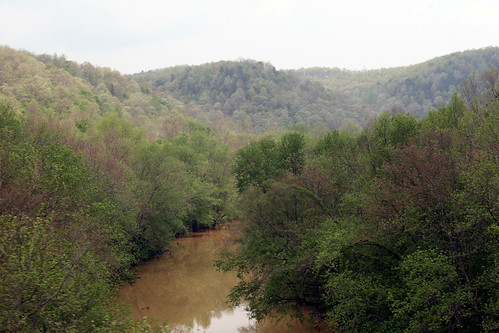
Rockcastle River near Cromer Ridge, Livingston, KY.
(*photo credit)
August 7, 2018 Cromer Ridge
The first off-road vehicle site in Kentucky;
very convenient for the riders from other states,
just off I-75 at Exit 49.
It's also ever so nice for green eco‑people,
who show it to the media and other voyeurs,
like a paraded freak, without involving local people.
The odd part is that most all ORVers disobey the law
driving more than a quarter mile on public road,
using private land with no written permission.
Who dares denounce tourism -- budding business number one,
except that leakage here -- tourist money going outside
is at one of the highest rates in the world.
Residents know there's something mighty wrong,
and we're reaching the limits of tolerance.
One deceased ASPI board member said he kept the
watermelon patch free of ORVers by using piano wire.
We vacillate; my days of a trusty shotgun are gone;
these holes of ass now are allowed to trespass.
Just what won't work:
Posturing about closing off the area by decree;
Elites feeling sorry for the land and people;
Talking to the ORV association as though they have power;
Asking manufacturers to stop the ads
that show vehicles on fragile lands.
I hate resorting to booby traps
with a host of shysters in the wings
to sue and take our property in a wink.
"Somebody might get killed," you say! As though the
five or more ORV riders killed each year
are not really dead -- just pretending.
Let's get some things straight;
those in the public interest aren't runnin' for office
and we don't care a whole lot about feelings.
We'd like your support in whatever fashion given,
but so-called hillbillies, the last such slur,
crave something more, respect for land and people.
AF 2001
----------------
P.S. This vintage poem was created on July 25, 2001; unfortunately, much of it is still pertinent in the summer of 2018.
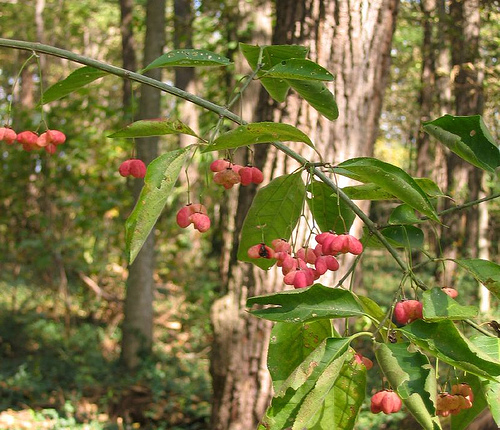
Burning bush, Euonymus atropurpureus.
(*photo credit)
August 8, 2018 Degrees of Environmental Greenness
We can be "green" in many ways: with envy, with foliage, with spilled paint, or environmental practice and beautification. In reference to being ecologically green, one level involves people wanting to save a river or endangered species. Specific laws, regulations and restrictions are imposed by government to see that this takes place. People try to stop air or water pollution, or deforestation, or to save the gray wolf or bald eagle. Actions on this level include climate change battles now being waged.
A second level of greenness looks beyond distant or unrelated polluting culprits to ourselves. We are humbled to discover that we all are partly to blame, in our use of resources for a host of consumer products that we find convenient. It is our consumption of goods that takes resources and accounts for almost two-thirds of the American economy. Such immense consumption patterns result in heavy non-renewable energy consumption for our electricity and mobility and take resources to replace the many items created, produced and promoted through a subtle process of planned obsolescence, i.e., lifestyle changes in what is fashionable. Under these circumstances, greenness goes beyond recognized dirty air and water; it includes consumer choices that have so much to do with the current economy. Being green may be turning off unused lights or equipment, installing LEDs lighting, driving electric or more energy efficient vehicles and growing one's own food, and a host of current simpler living techniques and consumer practices.
At a still deeper level we need a certain solidarity with our fragile Earth, a treatment of this beautiful planet as a sister or mother or other close relative -- for thus it is. Green folks are able to express this relationship in song, poetry, prayer, dance or other artistic and spiritual ways. This deeper level may not be primarily a natural consequence of the first two levels, but rather a major ingredient in the relationship of primitive and nature-loving people to their Earth, eco-spirituality expressed in different ways. Today people adapt the spirituality of others, but this spirituality may not fit their particular environment.
Secular answers are not sufficient in themselves. We must enhance our trust in God and see that we must find the Divine Harmony that is all around and proclaim it to the world. Pure secular approaches cannot sustain the enthusiasm that is the God within. Without a spiritual outlook, efforts to confront and control global warming will overwhelm the secular society. Today, the Earth, threatened by climate changes with serious ramifications for the world's poor, cries out for help. True solidarity hears the cry of the poor -- yes, poor people and poor Earth. At this deepest level of environmental involvement, the emphasis is on social justice that all who have recourse to a Higher Power. We cannot expect to act alone for long; we need God's help.
Prayer: Lord, make us green with the deepest hue and help us spread the message of environmental awareness to others as well.
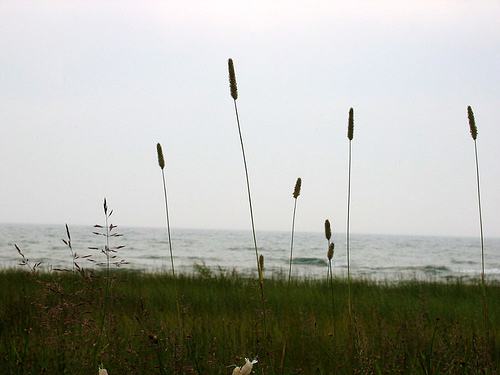
Taking a break near the shore, St. Ignace, MI.
(*photo credit)
August 9, 2018 Ten Ways to Beat the Heat
This is the month when temperatures ordinarily soar to the nineties Fahrenheit and we learn to live as best we can. The News Media tell of people, even young athletes, dying from heat stroke or elders suffering in uncooled apartments. We all need ways to beat the heat and help others, especially elders, to do the same.
* Rest, if possible, during the hottest part of the day.
* Drink plenty of water. We sometimes think that alcoholic beverages are good substitutes, but they generally take more moisture than they replenish, and cause light-headedness and rapid intoxication as well as dehydration. Soft drinks and other beverages are okay, but good water is the best. A rule of one fluid ounce for every two pounds of body rate is bantered about.
Beat it if you must.
* Eat more lightly. Keep to cold soups and dishes.
* Coffee may not help the thirsty. For them, more frequent restroom trips indicate the dehydrating effect of too much coffee.
* Encourage others to drink liquids. When in desert areas, guides always tell hikers that they may be unaware of severe dehydration before it is too late.
* Wear the right clothing. Many prefer broad-rimmed straw hats. All ought to wear loose fitting light-colored clothing and concentrate on such fabrics as cotton.
* Move more slowly. The amount of liquid needed varies according to a number of factors -- how much liquid loss has occurred over the past day, the size of the person, the amount of perspiring, and the rate of emission of body fluids.
* Limit mid-day activity. If you must engage in outdoor activity whether jogging or walking, do this in the cooler parts of the day. Minimize such activities during mid-day and carry a water container with you.
* Weight-watchers beware. Lowering weight can be easily achieved by reducing body moisture content. When doing physical exercise, one can eliminate four pounds (two liters) of fluids in a single exercise. Liquids need to be replenished. Achieve weight lost in less rigorous and safer ways.
* Keep indoors or in the shade. The shade is at least twenty degrees cooler -- and even more in the deeper wooded areas. My house is cool with no air conditioning thanks to good insulation, airing out at night, and some large nearby shade trees.
Prayer: Lord, teach us to know how to withstand the heat and assist others during hot periods of summer.
Types of Confrontation
We see the need for using confrontation when speaking of climate change issues; we are willing to undertake this or support those who do; we see this as part of our responsibility as citizens within a democratic society. The complexity of the issue demands a collaborative effort that may include serious confrontation of which we are at least in a support role. Once we have established the validity of proportionate confrontation as a form of legitimate action to usher in change, let's be cautioned that some forms of face-to-face interaction are to be avoided.
Negative approaches are worth reviewing because many people who oppose confrontation have negative methods foremost in mind; thus they are tempted to group and classify unspecified confrontation as unworthy of a charitable person -- and that inaction is a virtue.
Conquest and punishment. This is based on a superior sense of wanting to control or conquer another person and thus gain power and self-worth through the process. Those who seek such superior positions of authority are more prone to exercise this form of confrontation. Often this is accompanied by stern commands and an expectation that the subject being confronted will become subservient and continue to follow a proposed authority figure. Examples exist throughout history and where democracy is lacking.
Outburst and argumentation. Quite often confrontation occurs quickly and without much planning or forethought. Angry reaction to what occurs lead some to be aroused individually or even as a group or multitude; this form of action is often unpredictable and can easily move to extremes that could precipitate violent reaction as involving physical fights and struggles and even mob lynching. Such confrontations are feared by peaceful individuals and society as disturbances of peace. The act of “having words" is all too common, but most likely is of little worth for achieving positive results. Diplomacy and reasonable discussion are far more favored.
Needling and teasing. Frequently, this type of confrontation is present in households or institutional settings; it may be undertaken to relieve tension or to correct a minor situation or personality trait. Is it ever a good approach or justified, for it often deepens conflicts and leads to loss of tranquility? Perpetrators may deceive themselves in thinking they are doing something positive, and yet are putting the target person in an uncomfortable situation with nothing to gain. This can be a form of bullying and may even result in violent reaction.
Provocation and dueling: Custom in the past led to formal conflict that could even result in severe injury or death. Honor was regarded as the reason for such actions; the event was planned with certain agreed rules as to agents, conduct and weapons. Modern society has essentially outlawed such confrontations.
Positive approaches can come in a wide variety of ways:
Personal confrontation. Individuals are observed to be undertaking a wrongdoing that is perceived to hurt themselves or others. A face-to-face approach by the observer is a productive approach, but if this is not effective, others must be brought in to assist whether two or more, a process we treat elsewhere.
Witness. One can confront another who is fixed in a status quo situation of authority or custom. An example is Christ cleansing the Temple of the moneychangers. The act is public and quite clear and yet may be misinterpreted as frustration rather than spiritual motivation. Witnessing seeks longer term change and is a model for those who understand the need for change to either follow or take discerning heed. This public witness may endure some degree of risk, which increases the quality of the confronting act.
Collective citizen action. Confrontation is part of an ongoing political process and calls like-minded citizens to participate in bringing about change. At the same time this form of face-to-face interaction serves notice that differences exist; an opposition to current power and influence must now contend with a citizen power swelling up and seeking recognition and political victory. Such actions need not be violent if well planned, but are still threats to those in power; they can in some circumstances precipitate a violent reaction that is not directly intended.
Resistance. One form of confrontation is to resist the actions of another in some fashion and in a hopefully non-violent manner. Resistance can be justified, and this has included a long discussion of "just war theory." The initial act of conquest as mentioned above need not be passively endured, though in some cases that may be the only recourse for those who are e victims. In others, defensive measures take such forms as separating, retreating, hiding or fleeing from an abusive situation. We can argue that what one allows to happen to oneself by an aggressor should never extend to the same for our neighbor if resistance is possible. Some forms of resistance to halt violence to others is justified with efforts to immobilize the aggressor. Often urgency to act does not allow for careful discernment.
Formal debate. This is really the rational form of upholding honor in contrast to dueling and could include verbal or written formality. This becomes an intellectual exercise with the purpose of allowing the truth to emerge through discourse. Such an exercise includes controls on length of text or verbal exchange while providing moderation by a neutral party. In actuality, the discussion that we have been engaged in with climate change deniers is a modified version of a formal debate -- but this needs deepening to include other forms of confrontation. Positive forms of confrontation and application must be undertaken in a discerning manner when possible. That will be discussed next.

Loyal companion.
(*photo credit)
August 10, 2018 Animals Far and Near as Friends
This year I have reflected often on the ending of the Gospel of Mark (16:16) that tells us to go out and extend Good News to all creation. A few years ago, a small girl in Ethiopia was being forcefully taken by a group of men who wanted her to enter into a forced marriage. Three lions chased off the seven men and sat beside the frightened child for half of a day until help from her village arrived -- and then the lions departed. The people called it a miracle, but it also showed that animals have a sense of human beings in trouble, and they strive to help.
Wildlife are our friends as part of the family of all creation. That friendship was shown by such saints of old as Francis of Assisi, Blaise and others. Maybe some of the tales are fictional and maybe not. If we extend to animals such friendship as wildlife sanctuary caregivers manifest, then there is a mutual response. It is this mutuality that is so called for today in an age where heartlessness is accepted as the norm -- and fear of wildlife becomes quite pervasive. We recognize this friendship and the continuity of life with the family of all being.
A colleague once commented that God created dogs because we humans need companions who ask no questions. A loving dog knows when we suffer and need an uplifting. The guide dog and the security guards of our homes and businesses are our companions. Some dogs sense when a diabetic needs a treatment even before that person does -- and so sound the alarm before the person can blank out. Companions, whether domesticated or wild, make life better for us; their presence improves the quality of our lives. Often the young and the elderly crave companionship, and animals often fill the void. Over five hundred senior citizen facilities with aviaries and fish tanks attest to trying to fulfill companionship needs. A multitude of pet stores show this as well.
We are moved to observe wildlife, especially birds; we go to wildlife refuges and zoological gardens; we are fascinated by animal pictures and movies. Our attraction to animals and plants in a broader living community is part of being human. When we extend love and respect to them, we go beyond being merely human and take on the character of God's Divine Harmony and the Holy Spirit. We know that hardened criminals who are allowed to be dog trainers take on a new lease on life -- and are humanized in the process of being trainers. We delight in feeding squirrels and birds and in simply observing wildlife. Our total community life is improved by the presence of wildlife and diminished by the loss of endangered species. Even though not always as near as birds and deer, most wildlife is part of a community that adds spice to the total human family's journey. Furthermore, animal life that is nearer to us requires protection, for these animals answer our quest for companionship here and now.
Prayer: Lord, teach us to love all animals and regard them as friends and companions on our journey through life.
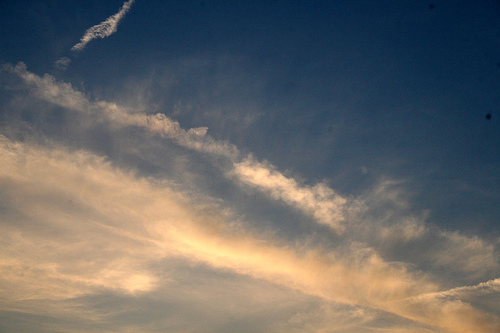
The ever-changing sky as sunset approaches.
(*photo credit)
August 11, 2018 Changing Pattern of American Ethnicity
American ethnicity is my long-time hobby; see Ethnic Atlas of the United States, <earthhealing.info/EA/into.html>. The hope is to have a complete publication after the 2020 census is completed (if I live so long!). Then ethnic changes starting in 1980 can be more definitely shown for each of the 3,000+ counties of our country. The data for the 2000 atlas totaled 25,000 entries for the fifty states, mainly from the 2000 U.S. Census; the cut-off per county is generally 1,000 people, and smaller concentrations are thus omitted as they fall below the "ethnic radar screen." The 2010 Atlas included highlighted places that celebrate ethnicity in various states of our nation.
Ethnicity has an environmental component. We respect our forbearers, those who nurtured us and gave us our good habits, and we learn from them to respect our planet Earth. In recent decades, a trend among second and third generations is to forget the past and glorify modern fashions. Respect erodes through historical illiteracy, lack of civility, and a desire for a melting pot that blurs the rich ethnicity that makes us who we are. In an age when languages are dying out worldwide at a rate of one every two weeks (by UN estimates), we find interest in our diverse ethnicity threatened and no longer regarded as a treasure worth preserving. Many forget that ethnic differences add richness and toleration to our American mosaic. Certainly, however, some individuals are concerned about ethnic identity loss and strive to reestablish their roots through genealogical research, return to lands of origin, and recording the thoughts of older relatives.
Often, people cling to their respective ethnic groups on arrival to America. With time and cultural integration, they lose contact with the Old Country, migrants die, ethnic social societies erode, and youth find more exciting things to do than to dress up in native costumes, learn ethnic dances, speak quaint languages to grandparents, and attend specific ethnic events. Ethnic churches and parishes that were so prevalent before the First World War tend to be merged or closed as succeeding generations move to the suburbs. Migrants amid much controversy continue to come legally or illegally to come from Latin America, Asia and the Middle East; they desire to retain their ethnic identity amid the pressures for assimilation. Spanish is rapidly becoming the second language of our country, thus slowing the normal pattern of assimilation through a rapidly growing transplanted Hispanic culture.
In contrast, many people, especially the English or Scotch-Irish, declare themselves to be "American" or non-designated. However, they are static or declining in numbers while minorities (Hispanic, Afro-American, Native American, Asian American and Pacific Islanders) are increasing faster than the majority white population. Non-designated folks are numerous in Appalachia, Ozarks and the Southeast. Intermarriage also blurs ethnicity.
Prayer: Lord, teach us to celebrate all ethnic groups.

Closeup of intricate purple passionflower, Passiflora incarnata, KY.
(*photo credit)
August 12, 2018 Proclaim the Real Presence
Our tasks demand our complete presence, not just being physically at this place, but being really here in spirit, mind and heart. We often speak about being present to flora and fauna and that means in vibes with them. Here we focus on our presence with other human beings. We must be open to what moves us to join or connect with others, to the spiritual dimension in our lives and mission. If we act bored or inattentive we will do the task poorly and thus be doomed to fail. "He simply is not here" may mean that he is physically present but not fully participating in the activity that is expected. It's not good and we know it.
Really present. At times, our degree of presence to others is a critical matter. We may be physically in the room when it is necessary to visit sick people and give them consolation. It is not that we have to involve ourselves in physical healing, for that is impossible when the person is dying. However, we are asked to simply be present in mind and heart. Others know very soon just how present we are to them through response, eye contact, facial and bodily gestures and in many ways. We speak to a person on the phone and we soon know that they are multi-tasking; "Are you driving?" The answer is often a sheepish, "Yes."
Real Divine Presence. We can also speak of God's presence to us: in the world around us; in the gathering of two or more at prayer; in the attention we give to the Lord right here; in the Eucharist. God's love and harmony extends to all the world and without that presence we would cease to be. Thus there is a divine presence that only the mystics probe to some degree. But presence really takes two from our standpoint. While God is always present, never absent, still it is our awareness or lack of it that involves our total presence before God. We crave an I-thou relationship. God is present to us but is not overbearing. We must respond for God, whose invitation is gentle and loving and expects our openness, our invitation into the Divine Harmony.
When we reflect on the Eucharist, we know that God is present in a special way. We ask about how open we are in response to this special presence. Do we respond with head and heart? Do we acknowledge the Real Presence of the Lord in a number of external gestures: through respect, by bowing and/or genuflection depending on culture and physical condition of the person? The Presence of the Lord is shown by a burning sanctuary light and by our open affirmation that God is present with the people. God does not need this sacramental presence, but we do. We need the physical/ spiritual reality before us, in order to achieve the tasks before us. Furthermore, we need to make God present to others by bringing out their openness to the spiritual dimension of their own lives and work before their Creator.
Prayer: Lord, make us all the more aware of your Real Presence in our midst; teach us to affirm this presence and to manifest a sense of awareness that all might be drawn to imitate.
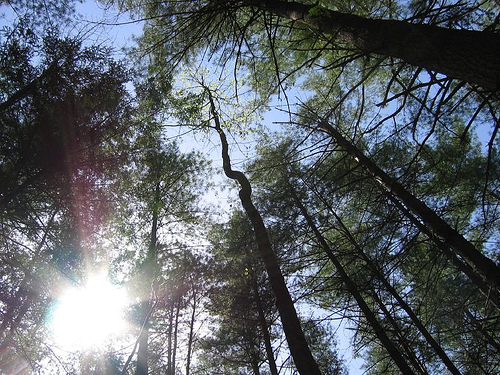
A skyward (daytime) view, Red River Gorge, KY.
(*photo credit)
August 13, 2018 Skygazing and the Perseid Meteor Showers
Tonight, we realize that the Perseid Meteor Showers are at their height. Pray for clear skies. This is a natural night light show that is entertaining for all ages of spectators. Make it a family affair. We gaze in wonder to the heavens. What about the rising and setting of planets, the appearance of comets, and the beginning and end of the cosmos? We have the example of the mystic, St. Ignatius of Loyola, who would spend night time gazing at the heavens in a more pollution-free Roman environment; for him this was an ideal time to converse with God in prayer.
Many eager potential sky-gazers are hindered by light pollution from viewing heavenly spectacles. However, the degree of hindrance varies depending on weather conditions, the local topography, which can shield areas from night glare, and the magnitude of night lighting in the vicinity. The hope is that all who are hindered will have opportunities to travel to areas with clearer skies; maybe they can be part of a low-budget camping trip and spend time seeing sky wonders that are hidden from where they live. The percentage of the world's population who can truly skygaze declines each year through urbanization and increasing light pollution. Curb TV and forsake video games and seek simpler form of entertainment at least for one night.
Primitive people were keen observers and developed sophisticated knowledge of the heavens. They learned about the changing constellations through the seasons, the exact position of stars with reference to local directions, the rising and setting of the planets, the phases of the moon, and the position of the sun in summer and winter, the length of day and night. Skygazing was thus more than an entertainment; it was an opportunity to refine one's observational skills. The star formations led to tales woven according to various cultural traditions. We westerners learn the ancient Greek names for constellations; the bodies of the heavens became gods and goddesses for people of old, and the deities interacted through the imaginative weaving of stories. For these earlier peoples, the heavens were their easily available national libraries and the source of their oral and written traditions; they observed that the heavens were in dynamic motion seasonally.
Very ancient traditions recorded extraordinary events in the dawn of human awareness, when an unexpected heavenly body came close to the Earth on its journey around the sun. The close call caused the possible breaking up of a planet in our solar system, and affected our Earth's polarity and rotational patterns, as well as created a violent wind, water, volcano, and earthquake super-phenomenon of a magnitude never before or since recorded. Read the well documented book Cataclysm: Compelling Evidence of a Cosmic Catastrophe in 9500 B.C. by D.S. Allan and J.B. Delair (Santa Fe, New Mexico: Bear & Company, 1997).
Prayer: I look into the heavens, made by your fingers, at the moon and stars you set in place. (Psalm 8:3)
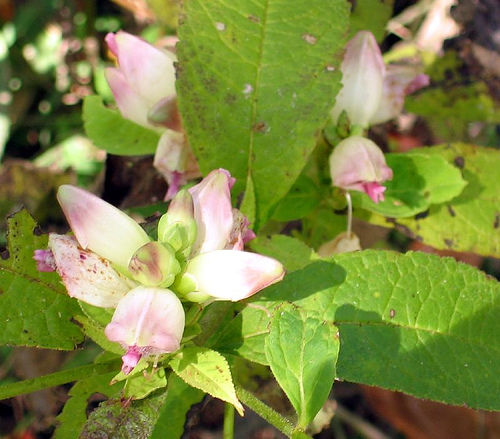
White turtlehead, Chelone glabra. Land Between the Lakes, KY.
(*photo credit)
August 14, 2018 Domestic Tornado Shelters and Food Storage
This past year we have experienced extreme weather events in hurricanes and tornados both in our country and neighboring countries and Caribbean islands -- with more still expected before the season ends In fact, no one knows how much these events are due to the much discussed climate change, but the likelihood is that there is a connection. A wise choice is for people to be prepared for the possibility of such events both in shelter and in supplies of emergency food, water and materials. Consider spending time during such events in or near home provided the shelter can withstand storms. These places can also serve as storage space.
We suggest that root cellars used for food preservation can also become tornado shelters. For centuries people realized that root cellars were ideal for storing surplus crops for winter in a non-processed manner. A wide variety of home produce can be stored successfully in root cellars: potatoes, beets, apples, cabbage, cauliflower, endive, celery, turnips, squash, endive, and peppers. Some people store certain vegetables in boxes of moist sand to preserve them from drying out. My mother would also store the canned preserves in our cellar on shelves built above a 3-by-12-foot by 2-foot-deep potato bin. Once built, there is no energy cost as with deep freezers -- unless we count occasional lighting.
An ideal root cellar should be accessible from the kitchen. Every foot away from the kitchen counts, so plan it with convenience in mind. The space will naturally be dark and cool, since the earth serves as an insulating and temperature modifying agent. As very young children, we would retreat to the coolness of our cellar during hot summer days to play card games. A moderate humidity is expected in an underground structure and is needed to keep produce from drying too much. However, moisture must not be allowed to accumulate, and so the cellar must be equipped with a drain. Within this space or at dryer locations elsewhere (attics or upper floors) one can store onions, beans and peas. Higher shelves should be used for pumpkins, squash and canned food. Herbs are better preserved for flavor in dryer places.
The type of root cellar may vary from larger exotic types of separate underground buildings to metal drums stored in a hillside. Easy access is important. Some prefer cellars with concrete floors, but gravel or even dirt floors are generally satisfactory. Ideally the space should have good ventilation and be made rodent-proof. A roof of a separate underground building that is heated by the sun may yield too high a temperature for an ideal root cellar. One may add a sod roof that would reduce the temperature to a suitable range, though added weight requires well- reinforced roof structures. A basement addition or compartment under the house may prove to be the most easily built and maintained root cellar. Popular magazines and the Internet provide numerous tips on design, construction and maintenance of these occasional tornado shelters.
Prayer: Lord, inspire us to be prepared for possible storms.
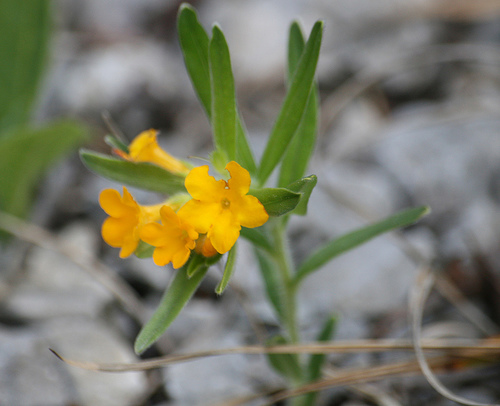
Hoary puccoon, Lithospermum canescens, Cedars of Lebanon, TN.
(*photo credit)
August 15, 2018 Mary and Choice
It was a choice made in a single moment. Would she say "yes" and be with a child who is the Messiah, or would she be like others who might say, "I have to have time to think this over"? Mary had already decided to be totally open to the Lord, and thus in this spirit of openness a choice came easily. "Fiat!" "Let it be done," for this is God's will. Thus Mary made the greatest choice ever undertaken by a mere mortal. But what a mortal was she!
Having made the definitive choice, Mary experienced happiness that knew no bounds, but in time this would be intermingled with sorrow and suffering as Simeon would foretell. Thus we celebrate her choice. We honor Mary with many feast days, about a thousand opportunities in an average lifetime (at least one a month). These feast days, like today's Feast of the Assumption, invite us to imagine a young maiden who, upon choosing, immediately undertakes a difficult fifty mile trip to stay with her cousin Elizabeth who needs her assistance and company. She does not kneel in rapture as some medieval paintings portray, but rather she takes a donkey on a dusty road, alone with the God-within, not in the soft light from stained-glass windows, but in broad daylight. She is needed.
Blessed are you among women. Our choice is to turn to Mary who is blessed and who sincerely acknowledges her God-given gifts. In giving her honor, we discover that we are also blessed people, and understand not our nothingness but our somethingness, most blessed of Earth's creatures; we come to realize that this human life is a gift from the Creator, not of our own making. In our gratitude we discover our place in the grand plan of salvation. We find Mary and want her at our side both in life's struggles and at death's portal to new life. Mary, Mother of the Church, is caring, nurturing, guiding, and healing, actions that we need to imitate.
Mary projects transparency, allowing us to peer into her pure soul. She acknowledges that she is the most blessed of women, not by what she does but by what God does for and through her. Hers is a mark of sincere humility. She directs us to Christ as any mother does to their children. She is a prism through which shines the Light of the World. To imagine Mary standing above us on some pedestal obscures the fullness of her very down-to-earth gifts. Rather, Mary goes ahead of us in the Assumption, for we too expect to pass into heaven after death even though our reunion with our bodies will occur after the final Judgment. Yes, whole again!
Mary's motherhood is God's way of teaching us the values of womanhood as well as motherhood. Mary stands for the unique contributions of all women to an understanding of how we must nurture precious things, and how human beings must heal and be truly compassionate. Empirically, women intuitively grasp the need for healing our wounded Earth, and they respond with a sense of compassion in an inherently womanly way. Mary does as well.
Prayer: Hail Mary, full of grace, the Lord is with you.

Exploring some newly-fallen dty leaves, eastern box turtle, Terrapene carolina carolina, Livingston, KY.
(*photo credit)
August 16, 2018 Toxic Chemicals in Your Home
I will never forget a conversation with a volunteer about forty years ago. She had gone back to Vermont for a home visit in the middle of her internship and told her mom she was working on household aerosol sprays. Her mother dismissed the so-called problem by saying there were no aerosol sprays in her house. The intern performed a thorough survey and found four dozen. Over time, I have irritated a number of school kids' moms, when the youth have gone back from school and performed a preliminary search in their homes to their parent's dismay. No one remembers everything; no one is perfect; and kids can be good auditors.
Know what constitutes toxic chemicals: paints and solvents, petroleum products (oil gasoline, etc.) and auto materials such as anti-freeze and brake fluids, building materials, hobby materials of various types, medicines, pesticides and fertilizers, strong household cleaners and desalting materials. Medicine cabinets are expected to have their drugs with exotic names and formulations, many of these still harmful, if misused even well after their expiration date. The space beneath the kitchen sink generally houses the second highest store of chemicals and especially aerosol sprays. Are they all being used or have some been abandoned?
Resolve to be toxic-free to the degree possible. My experience as a chemist makes me wary of the dangers that lurk in the use or misuse of commercial chemicals. Avoid exterminators, if possible. I personally prefer crickets to living exterminators, for these friends are cheaper, environmentally safe, won't harm residents, and will eat virtually all unwanted critters.
Look in forgotten places. Toxic chemicals are usually known as toxic and thus are stored away in remote places -- and can be forgotten there. It may be the cellar, the remote storage area or even the attic. Most likely, surprises will greet you. How about the garage and the outbuildings that are really somewhat removed from the house; these places are near enough to take leftovers and yet far enough to evade occasional observation and clean-ups.
Get rid of these forgotten items. Most local governments work with state and federal agencies in collecting and disposing of toxic chemicals. Contact them. Don't flush chemicals down the toilet or drain. Some suggest pouring waste oil along the exterior basement wall, but it is better to deliver this to waste oil collecting centers. Freeing your homes from toxic materials is a good practice before the autumn heating season begins. Recall that many average American homes have more chemicals than an 1850 scientific laboratory. Homemakers know little about the chemical toxicity and potency of all under their care; they are not experienced in handling the whole array of household chemicals properly. Resident or visiting toddlers may unearth toxic stuff.
Prayer: Lord, teach us to respect all of God's creation and to be doubly cautious about human-created products.
Discerning the Manner of Confrontation
There is no doubt that some people are more adept at face-to-face handling of a particular situation. Some mild-mannered people are simply non-confrontational by nature; they may or may not be ones called on to assume leadership in a social or political crisis situation. Are the confrontational-types the ones who must emphasize the critical situation and yet not take charge of the solution? Action is assumed to be needed for change to occur as in the case of addressing climate change. Some are to be catalysts to incite those who are known to be better suited to take part in the leading role (what we call the "secondary agents of change"). This does not mean that the most confrontational person is the best to serve as a long-standing primary agent of change.
A preliminary confrontation may set off a change of reactions that calls for balanced leadership. Here charisma enters the picture, for some can incite violence at critical moments when calm and deliberation is needed -- and some can calm down a tense situation. Discernment is critically necessary as to how to act both as primary and secondary agents of change, and who are called to be lead persons for an ongoing solution. Often the solution may take a multitude of activities, all with varied degrees of face-to-face interaction. Often diplomacy can work best in the longer haul. A less aggressive stance may be required to complete the change process and so confrontation blends with diplomacy, each with its time and place. Intuition and the "Spirit" have proper roles.
Environmental situation. From a U.S. environmental standpoint many activists regard 2018 as a prime time to directly confront the U.S. Administration's policy of withdrawal from and non-cooperation with the 2015 Paris Climate Change Accord. The U.S. must be a global actor as it is a global polluter. Leading figures in this Administration ignore scientific evidence as valid or trustworthy; they purge any consideration of climate change from regulatory actions undertaken; they hold that the status quo promotion of fossil fuels (Big Energy's position) at this time of renewable energy advance is proper; and they have taken steps to promote fossil fuels and nuclear power with tens of billions of dollars. As of this writing they refuse to work with the UN on climate change, which could lead to global catastrophe.
Environmental confrontation. Given the urgency of current climate change and the fact that transition to a renewable economy is slowed by the U.S. deliberate foot-dragging or "kicking," direct confronting actions are not only valid but necessary. Those within federal agencies who speak out against recent policies are fired or demoted; advisors from the scientific community are dismissed; research only is withheld; and text of previous information is expurgated. This deliberate anti-environmental campaign is a form of confrontation that must be resisted where and whenever possible.
Discernment of approaches. The confrontational approach sought here does not say "more research is necessary" -- as it theoretically always is. Rather let's circumvent the active deniers through political action. All citizens must act and support confrontational activists’ finances and give moral and active support in various ways:
Inform yourself. Surprisingly, many people do not want to delve into difficult issues, and thus take the escape route as mentioned before. Issues are accessible by a survey of the Internet and with some help from the more informed associates and neighbors. Reluctance to being at the forefront is NOT an excuse for non-involvement. Citizens in a democracy get involved!
Legal actions. For a half century, a number of environmental groups have taken successful legal actions against the slower moving governmental enforcement agencies. Today in the atmosphere of climate change denial these same groups are pursuing legal defenses of existing regulations and laws. Support them!
Marches and civic assemblies. One method has worked in the past and is needed today, especially when some want to complete the Keystone XL Pipeline to pass dirty Canadian oil through the US, or refuse to shut obsolete nuclear powerplants. To speak and act out is urgent, for public demonstration is never out-of-date.
Petitions. Some of this form of environmental action is effective depending on the popularity, clarity and direction of the petition. While this takes little effort and time, it is needed for citizens to be open to signing on and passing these to others who are like-minded. Sign and alert others to good petitions!
Singular events. Sometimes the creative act of following the Lord in driving the moneychangers from the Temple brings a positive person to do the spectacular (too often the unhinged pick up an assault rifle). Direct confrontation of the Environmental Protection Agency (EPA) director, Scott Pruitt, by individuals has resulted in his expanding his security detail. Violence is never condoned, but publicity requires events. Back the deserving!
Writings and opinions. Criticism from this website and others in social media may have little direct effect to date, even though there is a growing consciousness that critical changes are needed immediately to save this environment from crippling effects. Thanks for your expressed support of this website.
Contacting legislators. By means of letters, emails, and phone calls as well as direct lobbying of legislators, the responsible citizen may practice citizen based-confrontation. This is undoubtedly an opportunity to make a critical position known in the mind of the representative. Think about being direct!
This sample of actions is not complete, but for whichever method best suits your health, mobility and resources, now is the time to discern it prayerfully. The time is right to be effective.

Putty root (orchid), Aplectrum hyemale.
(*photo credit)
August 17, 2018 Growing Disparity of Rich and Poor
The rise of the social media in the Internet has resulted in some either by wit or luck in being present to become almost instant billionaires. The tax system allows their unchallenged accumulation of such wealth that threatened the heart of our democratic system. With such unregulated wealth these individuals become more powerful than entire nations; they are a new nobility with little or no added responsibility. President Obama pointed this out at the end of his administration to Facebook's director.
The Economic Policy Institute states that the top 0.1% of wage earners were paid 20 times what the bottom 90% received between 1947 and 1979; this disparity grew to 77 times by 2006. Also in 1979 some 34.2% of capital gains were paid to the top 1%; this figure grew to 65.3% in 2005. According to the Census Bureau during the period while this phenomenon was occurring, the income of the average American male worker actually stagnated and people made ends meet by the rise in women workers in the labor force.
Some of this growing disparity was due to the removal of high tax rates resulting in part from the decline of unionism and the union influence on political groups. Does globalization put a downward pressure on unskilled wages and reward the already wealthy.
This challenge is not just in the U.S.; the United Kingdom has experienced a similar pattern. Unfortunately, that growing disparity in wealth is even higher among poorer nations where some live in utter affluence and many others in destitution. An awakening is occurring, especially since so many nations are falling into hopelessly high levels of indebtedness. In 2000, the Year of Jubilee, we recalled the biblical passages to forgive debts during that period. And this mandate was partly addressed. However, the continued national indebtedness and the existence of vast wealth among the affluent makes us deeply uneasy eighteen years later.
Discontent with free market capitalism continues to mount. Social mobility, that last-century U.S. dream, has slowed down and in fact is less apparent in America than in such egalitarian societies as Norway or Denmark. A janitor's son has little chance of rising to be a company executive. Ethnic minorities have even less chance. A black American born into the bottom fifth of income groups has a 42% chance of remaining there in contrast to 17% chance for a white person. Why allow this disparity to continue? A host of factors included media favoritism for the wealthy, control of legislators by the wealthy, and unrealistic expectations by rank and file who think they can swim against the tide and become rich. As one people we demand an equitable economic system. Disparity and lack of economic mobility is a form of modern enslavement. Intolerable debts on poorer folks and excessive wealth are a reality we must face and address.
Prayer: Lord, inspire us to holy discontent; direct us to cleanse modern temples of the perversity of excessive wealth.

Valley Pike covered bridge, Mason Co., KY.
(*photo credit)
August 18, 2018 Reaffirm Appropriate Technology
Climate change demands rethinking about the way we live. Past extravagance is no longer viable, and so we look at sustainable ways practiced by our forbearers. What we term "Appropriate Technology" (AT) borrows generously from the wisdom and experience of the past, and yet adapts these practices to what is suitable and proportionate to similar modern circumstances. Unfortunately, today the word "technology" takes an Internet mentality.
AT is defined as environmentally benign, affordable, community enhancing, and people-friendly technologies such as solar energy applications, organic gardening, and low-cost housing made from local materials. When people need to cut back on affluent practices based on convenience and fashion, a number of opportunities afford themselves -- and considerable literature is available, e.g., 99 Ways to a Simple Lifestyle and Healing Appalachia: Sustainable Living through Appropriate Technology.
Yes, we ought to practice what we preach. My residence does not have air conditioning thought it becomes a challenge this summer; the place is very well insulated and the main lighting fixtures are LEDs. The Honda Civic hybrid gets over forty miles to the gallon; the parish hall and church are fitted with solar energy arrays; the grounds include some edible landscaping with fruit and nut trees, and vegetable and herb gardens intermixed with flowers. Water is conserved in a number of ways with a rain barrel and activated cistern in dry times. Hot water is from units on demand. Virtually all waste materials are recycled locally (plastics, paper and metal) or converted into mulch in a compost bin for garden use.
By accepting AT we offer opportunities for others to see what we do first hand and thus gently encourage changes in their own lives. Thus AT practices become Good News; these ways are not only workable and economical, but also can offer the chance to exercise and touch the soil, to be in tune spiritually with our Earth, and to do all this through affordable means. AT activities produce results here and now that can be easily seen and understood by others. AT is a promise for the future that we help create.
AT provides the tools needed for simpler living and for downsizing our lives, a pattern necessary in this age of global warming. Rather than being a retroactive return to the past, AT brings the higher quality of time-tested past practices to full fruition, thus honoring those who went before us. AT appeals to all ages and backgrounds. Folks can gain a simple expertise that is valuable for their own lives and the lives of neighbors. AT is not static; it grows with the age, requiring research and sharing of experiences in a wider world of practice; AT proponents smooth rough edges and find ways to make lifestyle applications easier.
Prayer: Lord, give us the gift of healing through the use of appropriate technology. Help us to be satisfied by down-scaling our own lives and assisting others to do the same.

Sycamore leaf, Platanus occidentalis, at streamside.
(*photo credit)
August 19, 2018 Nourishing Belief in the Future
I am the living bread come down from heaven. (John 6:51)
The challenge today is one of preserving sustainability for the planet on which we live. Thus the problem is one of immense importance for it involves the effort of all of us. Our mission of taking responsibility is urgent; our endeavors must be meaningful. Therefore we need nourishment to sustain us during the mission we have to perform -- for such efforts require that we be spiritually healthy as well as in the best form possible. Being aware of the tasks before us means a clear vision that results are not short-lived. Eternal destiny is for the long haul, and that involves preparing for a New Heaven and New Earth.
The temptation is to retreat from this massive challenge and conclude that the task is too big for us. Instead of deliberate engagement, we may fall victim to individual piety and devotion and the tendency to focus on our precious selves -- "and the world be damned." Such people are enveloped with a despair as to effecting change and, instead of having faith in the future, they believe that if we just endure the present condition cheerfully all will be fine in the long run. Thus they conclude that it is satisfactory to "make work" and "spin wheels." A sterile and false sense of fidelity overwhelms these believers, and for them success is expected through a divine miracle. They become mere spectators and refuse to help create the ultimate future that is expected.
The call for those seeking eternal life in Christ is that God wills that all be saved. God extends his love to us who may freely accept or reject it. Furthermore, it is God's will that we enter into the salvation process in some way, to repair the damage done by human misdeeds, and to bring creation back to an ordering that is needed for the longer-term. Thus the love of God extends to all people and all creatures. The love includes our companionship and responsibility in manifesting divine love through saving deeds. Creation and redemption involve us -- in so far as we are part of the Body of Christ.
This bring us to one conclusion: the nourishment required for the profound activities that we are to undertake can only come if we are fully members of the Body of Christ; we must be part of God's family, for we need God's nourishment to sustain us. Since that sustenance is of love, then only Love can be our food, and God is love. The food we must receive to undertake the urgent tasks before us is Godself. Some people fail to see the need for constant nourishment and try to struggle on their own as though they need no divine assistance. As the humble addicts who see the need for a Higher Power in life, so we addicted to materialism and secular practices need God ever so close as frequent Eucharist.
Prayer: Lord, inspire us to participate in the banquet by grinding wheat, crushing grapes, baking bread, and fermenting wine: "work of human hands." Help us fully participate in the Liturgy.
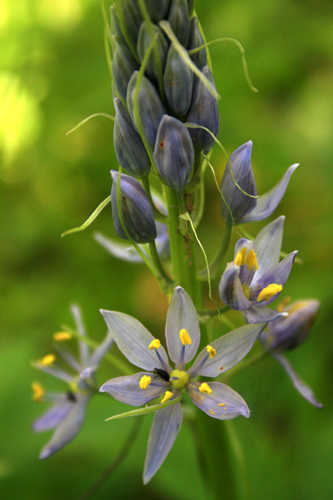
Wild hyacinth, Camassia scilloides.
(*photo credit)
August 20, 2018 How Do We Look upon Terrorists?
We all think we can deal with people of various sorts, even those who challenge us on occasion. Some even think they can successfully confront those who frighten us as creators of terror through their evil intent. Can we really deal with a crazy person who is bent on destruction at an individual or community level? What about an emotional person who feels impelled to correct a perceived social injustice through his or her own action? In fact, the uncontrollable nature of their threat makes them instruments of power and drawers of attention in the wider public arena.
Yes, since 9-11, a host of terrorist attacks have occurred in many lands: France, UK, Germany, Russia, Spain, Belgium and many parts of the Middle East as well as Pakistan and Afghanistan. Even though frequent we take each terrorist act seriously. We support caution on an individual level and the ongoing activities of the U.S. Department of Homeland Security, as well as state and local governmental agencies. The current trends make massive gatherings more dangerous (note Las Vegas) and everyday public gatherings for commerce and celebration more challenging. Will these trends reduce us to TV spectators who rarely venture out to gatherings?
What drives certain people to be terrorists? We may attempt to put ourselves into a sane suicide bomber's shoes, a person bent on overthrowing a perceived unjust government or political or economic group. Terrorists in another age were often called partisans or freedom fighters. By designating a certain person as a "terrorist," we place his or her cause outside our little world. Terrorists may think of themselves as potential martyrs, and even heroes and heroines. Heavens forbid, instead of feeling shame, some of their peers and families may praise their efforts. They are drugged or motivated to become weapons of mass destruction. We disagree with their reasoning, motives, and limited outlook, but we must acquaint ourselves with the situations of hopelessness that cause such acts. Still we must always be people of compassion.
We cannot possibly condone modern terrorist acts, but can we be sympathetic to underlying difficulties that potential terrorists endure? Many are driven in desperation by unemployment, poverty, lack of future betterment, and undemocratic and repressive regimes. We can exert compassion and suffer with people while not condoning their acts. Terrorists see black or white in a gray world, but do we do the same at times? Putting ourselves in their shoes, would we not discover that some live in their own state of terror often in their minds and in the condition of extremism that they have allowed themselves to fall into.
Terrorism may even have a broader definition. Any desperate person who is unable to feed his or her family is terrorized. Should we reexamine what constitutes terrorism in its many forms?
Prayer: Lord, give us a more compassion and spiritual insight into the terrorist and to all the many victims of terrorism.

Reflections in a garden bird bath.
(*photo credit)
August 21, 2018 Honoring Centenarians and Other Elders
On this Senior Citizen's Day we recognize those of us who have moved through the prime of life and are now part of the rapidly expanding community of the very elderly. Their status is a rare blessing. As George Allen neared that age he observed it must be getting safer since he read of few dying at that age. With reaching 100 even two decades away, the remnant experience diminishment of mobility and agility. Yes, we elders must undergo drivers' retesting hurdles; we are reminded that we are forgetful; we simply do not hear or see as well. However material blessings include discounts on senior menus and deference to elders.
The senior does not panic as much because of past experience; citizenship remains an ever-expanding responsibility; freedom to be plain spoken exists along with a sense of history to back up claims; we have less to lose when there is so little time to gain more. Recalled past mistakes become opportunities for exercising better judgment. The youthful universe actually increases as a higher proportion of the population becomes younger for us advancing elders. When I was ten, our eighty-nine year-old neighbor (see Joe Davis story on this website) was ancient.
We are told that those who want to live to be one hundred years live longer. In the inverse, those who do not care to live will give up more readily, and this shortens lives. Practicing a ministry of gratitude allows the elderly to enjoy life no matter how long our allotment of earthly time. Longevity is not always the result of our own doings, a fact that is evident when we meet younger people who struggle with cancer or heart disease, or when we attend a young auto-accident victim's funeral. Life is fragile, unpredictable, relatively short, and a gift to thank God for.
In this modern age we observe public health and lifestyle improvements that give rise to a rapidly expanding crop of seniors in the United States. That is not true in some countries such as sub-Saharan Africa or other lands, ravaged by AIDS or other diseases and some experiencing life span declines. With growing numbers of senior citizens, priorities tend to change and education issues take a back seat to health concerns. However, seniors can imitate the same self-centeredness as younger eager folks by focusing on maturity issues of health care, housing, and retirement benefits. We need to be reminded that citizenship extends to the entire community, not just to the wants of a particular generation.
Centenarians are a blessing and grateful ones a double blessing; their way of living is worth imitating; their observations are generally insightful; their mile-markers deserve public celebration. Most cultures treasure their elders and ours should do the same. American seniors vote frequently, clamor for benefits, and break silence; centenarians do the same.
Prayer: Lord, a hundred years are as a day to You, but not to us. Help us see the value of the time given to us as gift.

Fowler toad (Bufo fowleri) on slab of fossil-laden Lexington limestone.
(*photo credit)
August 22, 2018 Don't Pet or Make Pets of Wildlife
I accept the need for many to have pets, either to assist them as "seeing eye" or watch dogs or simply to act as companions within or around the house. But pets are animals under one's control to some degree. Wildlife was never meant to be such, though some can endear themselves to pet crows or raccoons or monkeys. Even the more domesticated pets are bothersome enough to keep maintained and safe from dangers -- but wildlife? Exotic pets such as tigers or snakes can escape and harm or frighten neighbors. Plants can escape as well. In fact, over 40% of all imperiled U.S. native plants and animals are at risk because of invasive species, which are not native. Most states have regulations that restrict ownership of many of these exotic species and many of us wish that these regulations would be extended to pit bulls as well.
At various times articles appear dealing with "Alien Invaders," namely, the exotic plants and animals introduced and sometimes intentionally released or escaped; these ex-pets now become problems due to uncontrolled proliferation. This occurs, as in the case of the Burmese python in southern Florida, in areas where no natural predator restricts their rapid increase. And animals can be invasive species (red fox, comb jellyfish, fire ant, starling, nutria, etc.). America is awash with exotic pets that folks think is cute to capture. In most cases, escaped animals will not find a mate and will simply linger for a period of time and pass through life -- but it may do damage or harm in many ways. Pet lovers forget what escapes may entail. The invasive red-eared slider (turtle) eats native frogs, mollusks, and birds and competes with native turtles. What about the menace of Asian carp, which are top feeders and regarded highly now in gourmet restaurants?
We can enjoy wildlife from a distance either in pictures or through binoculars. Wildlife, and especially exotic species, can be uncontrollable under conditions of attempted control. The media all too often have stories about how children and adults are mauled by animals that seem cute and cuddly to the pet owner who may say, "Don't worry, it won't hurt you." In the extreme, exotic pet owners have been jailed for manslaughter. We read of a tiger that turned unexpectedly on its trainer before thousands of people and left him gravely wounded.
A National Geographic article has one telling picture of a young boy pleading with his dad to let him buy an exotic in a pet store. Who is really at fault? The youth likes what he sees; the pet store offers a species that the wildlife conservationists say should be left in the wild; the father caves in. The blame goes further, that is, to a society that permits the dangerous exotic to be placed in homes for keeping and stores for sale. Stories of escape and lack of control abound in our permissive society, which is now beginning to forbid exotic possession or to restrict use.
Prayer: Lord, help us be satisfied to observe exotic virtually in the wild without attempting to pet, capture or possess them.

A summer bouquet of coneflowers.
(*photo credit)
August 23, 2018 Energy Efficiency: Light-Emitting Diodes (LEDs)
A decade ago we spoke about energy efficiency through lighting with an emphasis on switching from antiquated energy-wasteful incandescent bulbs to compact fluorescent lighting (CFL) -- and now a step farther to light-emitting diodes (LEDs), a form of electroluminescence. Both more recent types reduce the carbon footprints. Lighting is a major energy use both at home and businesses, and in both indoor and outdoor electric lighting with its safety factors.
Major advances have occurred in the past two decades in LED forms of applications manifesting lower energy consumption, longer lifetime, smaller size, and faster switching; they are now used in traffic signals, auto lighting, cameras, and aviation lighting. The types that screw right into the incandescent bulb socket are now commonly available in supermarkets and stores. Practice energy conservation in time it takes to screw in a light bulb.
A decade ago the U.S. Environmental Protection Agency’s CFLs, qualified by the ENERGY STAR program of the United States Environmental Protection Program, were found to use up to 75% less energy than standard incandescent bulbs, which lose much of their energy as heat. Test the difference, but be careful not to burn yourself. We are now finding that electric power companies are assisting in promoting this change in both home and office.
Modern LEDs last longer than incandescent bulbs, sometimes up to ten times as long. Thus ultimate savings for this more expensive bulb come in both energy saved and longer life. Today, many look for quick-fix economies, and find that LEDs save money without the change of lifestyle practice necessitated by other conservation measures. If every family replaced its five most used light fixtures with Energy Star qualified lighting, a saving of at least $60 per year would accrue to the average household.
LEDs help combat the climate change problems. If every family in America would take the above step, a reduction in greenhouse gases would be one trillion pounds/year (U.S. Govt. calculations). LEDs can reduce energy needs by simply replacing the five most frequently used bulbs in the home; this would cut projected need for new powerplants in half for two decades. A combination of this and solar and wind energy techniques could solve America's impending energy crisis without building a single new powerplant.
The practice of turning on and off lighting requires a slight adjustment: if a recent improved bulb is used again within a three-hour period, leave it burning rather than to turn it on and off, since it is the turning on that takes the most energy. Don't extend this new practice to older incandescent bulbs. Change to LEDs ASAP for they use less electricity, last longer and are a sign that we are committed to making a greener world.
Prayer: Lord, light to the world, please enlighten us to focus on all the means possible to reduce our carbon footprint.
Twelve Principles on Sharing Faith
After considering confrontation, one wonders how it applies to various forms of social and political action. The following are a five-year ecumenical undertaking to list twelve components that Christians are called to adhere to when seeking to fulfill Christ's Commission to go out to all the world with the Word. The wording of the 12 principles are assembled by Christian Post reporter Stoyan Zaimov (May 29, 2018). In brackets I have inserted an additional confrontational approach while affirming what has been said by the consensus grouping is valid and uncontested as such.
1. Acting in God's Love. "Christians believe that God is the source of all love and accordingly, in their witness they are called to live lives to love their neighbors as themselves (cf. Matthew 22:34-40; John 14:15)," the document declares. [This love is shown by sharing with the needy in social, economic and political circumstances].
2. Imitating Jesus Christ. "In all aspects of life, and especially in their witness, Christians are called to follow the example and teachings of Jesus Christ, sharing his love, giving glory and honor to God the Father in the power of the Holy Spirit," it says. [Jesus is willing to confront the privileged few, and so ought we as not being one of them].
3. Christian virtues. "Christians are called to conduct themselves with integrity, charity, compassion and humility, and overcome all arrogance, condescension and disparagement." [Christians must be in solidarity with the poor, which at times demands degrees of confrontation].
4. Acts of service and justice. "Christians are called to act justly and to love tenderly (cf. Micah 6:8). They are further called to serve others and in so doing to recognize Christ in the least of their sisters and brothers (cf. Matthew 25:45). Acts of service, such as providing education, health care, relief services and acts of justice and advocacy are an integral part of witnessing to the Gospel." [Part of service is liberation from the bonds of materialism and secularism, which could trigger the system to violence and negative confrontational actions].
5. Discernment in ministries of healing. The document advises believers to exercise discernment when it comes to ministries of healing, "fully respecting human dignity and ensuring that the vulnerability of people and their need for healing are not exploited." [Healing involves more than actions directed to individuals and includes ailing political and social systems, institutions and Earth herself. Unjust activity by these groups must be exposed and confronted to the degree possible].
6. Rejection of violence. Christians are called to reject all forms of violence, even psychological or social, including the abuse of power in their witness." [Current food, health and lodging insecurity is a form of violence, which is not often recognized and acknowledged; this must be openly exposed and confronted even when the violent ones seem to be friends at times].
7. Freedom of Religion and Belief. Christians are called to "engage in a prophetic witness," denouncing a form of religious oppression. [...and any form of prevailing secular or non-religious oppression to the degree possible].
8. Mutual respect and solidarity. Christians are called to commit themselves to work with all people in mutual respect, promoting together justice, peace and the common good. Inter-religious cooperation is an essential dimension of such commitment." [When establishing peace and harmony in our world, cooperation extends to secular and non-religious groups as well].
9. Respect for all people. Believers are called to recognize that the Gospel "both challenges and enriches cultures." "Even when the Gospel challenges certain aspects of cultures, Christian are called to respect all people. Christians are also called to discern elements in their own cultures that are challenged by the Gospel." [All cultures speak a word of the Creator, and so we honor all cultures as containing often hidden values worth spreading to the broader world, a fact integral to the Christian message].
10. Renouncing false witness. "Christians are to speak sincerely and respectfully; they are to listen in order to learn about and understand others' belief and practices, and are encouraged to acknowledge and appreciate what is true and good in them. Any comment or critical approach should be made in a spirit of mutual respect, making sure not to bear false witness concerning other religions." [Nothing needs to be added but Amen!].
11. Ensuring personal discernment. "Christians are to acknowledge that changing one's religion is a decisive step that must be accompanied by sufficient time for adequate reflection and preparation, through a process ensuring full personal freedom."
[Pressure by Prosperity Christians is not to be tolerated, for it is a sham front for some being enriched in a theologically-worded racket that must be exposed publicly].
12. Building interreligious relationships. "Christians are called to build relationships with people of other religions in order to "facilitate deeper mutual understanding, reconciliation and cooperation for the common good." [This thrust must also be extended to the non-religious world where mutual and universal cooperation is necessary in order to save our threatened Earth].
Some readers may object to some of the bracketed inserts. I welcome your comments and proposed changes.

Overlooking scenic lake, eastern Wyoming.
(*photo credit)
August 24, 2018 Earthhealing and Environmental Consciousness
Earth is God's marvelous creation in which we are privileged to dwell and gather the fruits of the Almighty's handiwork. This planet is fragile and can be damaged by human misdeeds. We show our gratitude by taking on the responsibility to heal what has been damaged by human ignorance, greed and thoughtlessness. The healing task requires our concerted efforts, though we never thought in such terms before the rise of environmental consciousness within the last four decades. Three principal elements of this awareness are worth our deeper and prayerful reflection:
* All creation is good and marvelous to behold. This planet was first seen from a distance through space exploration and appeared as a beautiful blue-green globe. The photograph engendered a sense of wonder and gratitude for being part of God's handiwork. We praise the Creator who initiated the Big Bang and transformation of elements to the present chemical structure in those first micro-seconds of creation and then through a 14-billion-year history. We become aware of macrocosmic vastness and microcosmic complexity, birth and death of galaxies, and expanse of unknown wonders such as dark energy and matter not yet understood. Divine Harmony resounds throughout the universe.
* The Earth is harmed by human neglect. Misdeeds occur, and salvation demands a redeeming act. We recognize these misdeeds done by us as individual humans and as part of the social body having the freedom to choose good or evil. The choice of good is the choice for life. In the process of industrialization we began to observe misdeeds involving air and water pollution caused by over- and misuse of resources. These include deforestation and species extinction. We now are aware of climate change resulting from overuse of fossil fuels. Recognizing our misdeeds is a necessary part of the process, for we humans are to blame and we must restore the disorder created by us. Christians believe in the saving power of Jesus Christ and he is our model and guide.
* Earthhealing involves saving our Earth through a belief in the future. We must all work together to save our Earth; we must all have a sense that the work will bear fruit and that we can shape this future. We need inspiration lest the enormity of the work ahead overwhelms us. If we have harmed the Earth in the past, a firm resolve to heal does not of itself protect against continuing or future harm. Thus what is appropriate must be sought, and this extends beyond technology to include profound changes in the economic and social systems of the past along with trust in our Creator. We must encourage and foster the uniqueness of all human gifts. The time to act is now, lest continuing tolerance of destructive practices irreversibly harm our planet. We need divine assistance to carry on.
Prayer: Lord, grant us the praise and thankfulness to appreciate the gift of creation, the contriteness to see our misdeeds and the inspiration to use our gifts to heal our Earth.

Must thistle, Carduus nutans, European native widely distributed in North America.
(*photo credit)
August 25, 2018 Migrants and American Opportunity
You must not molest or oppress the stranger, for you were once foreigners yourselves in the land of Egypt. (Exodus 22:20)
Jose was a migrant, a family man, a hard worker and a member of our parish. One Saturday he went to the store to replenish supplies using a friend's truck with which he was unfamiliar. On leaving the parking lot, he stopped at the exit sign and extended the truck too far in the face of ongoing traffic. In backing up he apparently tapped a car just behind him. Not even hearing this, he drove on to the next store. The woman driver in the tapped car was irate that a person of his nationality should "hit and run." She hailed the police and confronted Jose. Jose was bewildered and the next thing he knew he was hauled into court. I begged the woman to drop the charges against Jose but for a long period she refused while making nasty remarks about immigrants. The case was ultimately dismissed with Jose paying the very minor damage -- and losing nearly a thousand dollars in lost wages and fees.
America is peopled by immigrants and has welcomed them when times required willing workers. In tough times, the tune may be different and so it is today. For the greater part, we are all strangers and guests; even indigenous folks were immigrants at one time. People come here legally or not so, because they see America as a land of opportunity; they will use virtually any means to do so. This allows them to be prey to the dishonest and to be lured to this country with no provision for sponsorship. Many undocumented workers are at the mercy of employers who need them because many Americans will not take these difficult jobs. Migrants often seek to remain hidden and this reduces security.
Although we do not have to have a totally open door policy, treatment of immigrants must be fair and just. Legislation is now being debated by Congress, and we hope this will allow for the rights of all people even poor migrants and especially dreamers. Certainly it can be argued that it takes fewer resources to furnish employment for the migrant in the land of origin than in the land of destination -- but that takes social and political will on the part of two countries. In times of change like these, return migration is strong and is a partial corrective measure to the utter disappointment of those seeking to come and stay in our land.
Should there not be a reasonable flow of human traffic from lands of origin that includes guest worker cards and reasonable opportunities while here? Should our country spend less on walls of division and more on attention to regulation of employers who need migrants to fill certain positions? It is impossible to say "no" to large numbers seeking entry, and still keep our name as the land of opportunity. However, we need neither a totally open nor closed door policy. Let’s welcome immigrants.
Prayer: Lord, allow us to recall that we are all strangers and guests, and not residents with special privileges.
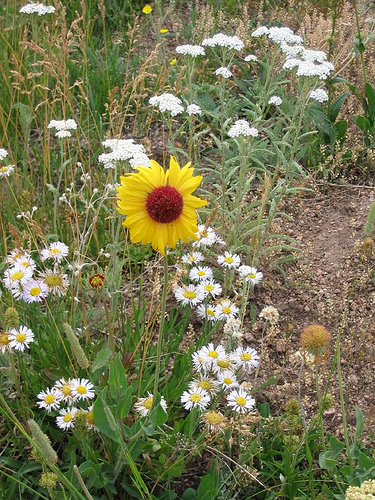
An August natural arrangement of mixed wildflowers.
(*photo credit)
August 26, 2018 Trust in the Lord
"Lord, who shall we go to? You have the message of eternal life, and we believe; we know that you are the holy one of God." (John 6:68-69)
The Eucharistic mystery requires faith on the part of the believer, and this is often for unbelievers. In many ways by the grace of God this faith grows with increase in trust.
A decade ago I was captivated by a story of a young family who was seeking to find a permanent farm in Upper Michigan, after spending a good part of the winter in a temporary-housing camper. After much travail and prayer they found an ideal farm in the perfect location. The Michael Larner Family concludes their narrative of their odyssey from February 2008 through August 2009 with the words, "Jesus, I trust in You!" What is more important is that often when things do not work out as desired, the actual result may prove for the better in the long run. Trust always.
We often lack a sense of simple trust. Jesus promises that whatever we ask will be given, if we firmly believe that it will be done. Do we pray with that simple trust for what is needed to save our wounded Earth? During the past few Sundays we have focused on the mystery of the Eucharist. The conclusion in Chapter Six of St. John's Gospel has a note of sadness: many walked away in unbelief. This ending makes us aware that our faith response is essential, for the power of the Eucharist to be felt by others. The trust is not an automatic or compelled response; it demands our freedom and our participation with the graces of God.
This brings us back to the crusade called for in healing our wounded Earth. This healing is not inevitable. We can save our planet through a real effort, but this takes work. We have the nutrition to give us the energy to do our part. As we find that Christ is with us, we grow in the urgency of the mission, for he lives within us and guides us. But we must trust that the power of God works within us in special ways. Without the divine nourishment we cannot continue.
Never before has the mission been so urgent -- and this mission is open to failure. Never before has there been such a threat to human existence (and that of other flora and fauna) on this planet. The demand is for meaningful urgent action, which has the cooperation and participation of all people of good will. To continue to call for this participative action requires people who have a faith in the future, a faith that is nurtured by real spiritual food -- not by symbols, not by play acting. The saving work in which we are engaged must be undertaken by God and the food is nothing less than God self.
Prayer: Lord, inspire us to trust in you with all our hearts. We need you more in these troubled times, for too many think our problems are solved in a secular way -- and they are mistaken.
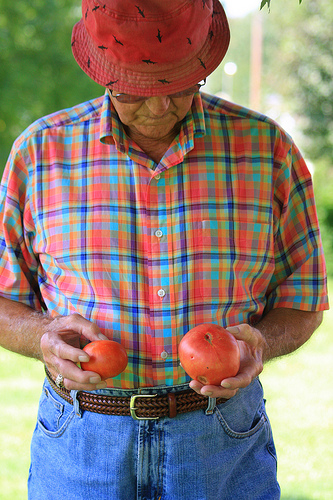
Kentucky organic farmer celebrates tomato harvest.
(*photo credit)
August 27, 2018 Tomatoes and Avoiding Cancer
August is the time for tomatoes right off the vine, iced and sliced, stewed, crushed, juiced, fried, canned whole, and transformed into catsup, paste, soup and sauce, and mixed with chilies. Then there was in my mother's special tomato preserves and green tomato mock mincemeat. Tomatoes play such a major role in the diet that we forget they came late in European cuisine. Before the New World was known, Italians had no tomatoes for pastas. When Europeans came to the Americas they hesitated before eating nightshade fruit on plants with poisonous roots, vine and leaves. Not only is the tomato not poisonous, it is quite healthy with its vitamin C and antioxidant properties, all good for the war against cancer. Tomato connoisseurs only reduce tomato consumption when their sweat becomes so acid that it irritates their skin.
Tomatoes have been a mainstay in my garden efforts: early ones for late June and July, dark red larger beef steaks in August, cherry tomatoes for all seasons, yellow less-acidic ones for September, Italian varieties during dry times, and pear tomatoes for autumn. Cherry tomatoes can hang in the greenhouse to ripen long after frost. I even wrap tomatoes singly and store them for Thanksgiving and beyond. For a few recent years my garden has suffered from a tomato blight. By other ingenious ways one can start tomatoes early and extend the season for extra months. Be careful to protected blooms, for the plants will not bear after enduring low temperatures. Staking tomatoes may be helpful for those of us with limited garden space.
Other foods also can be added to the diet to protect against cancer along with engaging in regular physical exercise. As far back as 1982, the National Research Council released a report that stated that proper diet may someday reduce the incidence of cancer by one-third. Not all cancers are diet-related, but a better diet will make us more able to battle the common diseases that afflict our modern population. What we are saying here is that balance in diets with no excess of salt, fats, or sugars all add to better health. But I feel sorry for those who through delicate stomachs or other difficulties have to abstain from even low acid tomatoes.
Besides tomatoes, the daily diet should favor high fiber whole-grain cereals, fruits and vegetables, especially those rich in Vitamin C and Vitamin A. The heavy use of fiber helps us avoid colon cancer. Emphasis is given to citrus fruits, dark-green and deep yellow vegetables and those of the cabbage or brassica family (kale, broccoli, collards, cauliflower, kohlrabi, cabbage, Brussels sprouts, etc.). Vitamins and minerals such as trace amounts of selenium are found in the cruciferous vegetables (brassicas together with radish, horseradish, turnip, etc. that have cross-shaped flowers, pointed pods, and strong cabbage-like odors); these trace materials inhibit the formation of cancer-causing conditions.
Prayer: Lord, make us aware of the good foods of August and to welcome the opportunity to eat them fresh from the garden.
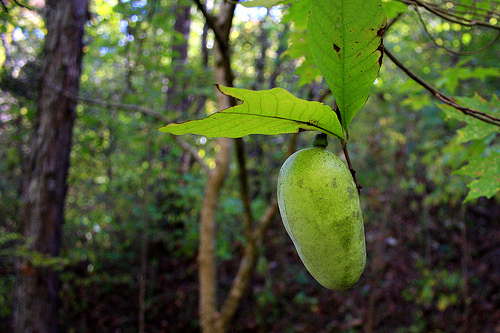
Pawpaw, Asimina triloba, native north American fruit tree.
(*photo credit)
August 28, 2018 Down-to-Earth Spirituality Versus Pretending
In order to heal our wounded Earth we must be involved and this demands a spiritual approach. We cannot pretend others will see the problems and handle them for us. For better or worse we are all connected and have a role to play: by acknowledging the problem (no denial of problem); by accepting our mission (no excuse for blame); and by becoming involved in the outcome (no escape from healing operation). Acknowledgment, acceptance of responsibility and participation in healing are the triad of duties that require a deep spirit base -- one rooted in the Earth and united with God.
The enemy of a down-to-earth spirituality is material affluence; this condition elevates people to pretend to be the privileged elite who see no problem, bear no blame, and know how to solve any difficulty in their own way and apart from collaboration with the poor. This results in being spiritually ethereal, hesitant to look at human causes, and unwilling to get hands and feet dirty. In plain language, affluence leads to ultimate ruin of both soul and planet. Our challenge is to espouse an authentic spirituality that keeps us genuinely rooted and yet with eyes on a distant horizon. Is this dual approach possible?
First we are immersed in God's creation and thus praise the Almighty for the opportunity to exist here at this time. Being aware of our local environment allows us to appreciate those who influence our place and time: the HERE and the NOW and the WE. Thus our spirituality is conditioned by where we are, the time in which we live, and those with whom we associate. Due to my time, place, and association, my spirituality is unique to me.
However, we know that things are wrong, though we prefer to transfer the blame to some individual or group distant from ourselves. To do this takes some "make-believing" and pretending. When participating in American culture, we realize that much is based on popular fiction. The suburb with its manicured lawn is fake "natural" landscape; the gas guzzler, the spacious home, the recycling of unnecessary consumer products, and the affirmation of short-term solutions to problems are all pretenses. Pretending is culturally acceptable and yet it erodes any long-term integrity.
Coming to reality takes effort on our part. Yes, we learn the season of the year, the direction of the wind, when the berries and fruit ripen, how much daylight is available, and when the summer is now half spent. Being down-to-Earth means we know what is happening, are willing to make practical judgments and are determined to live simply. We discover that our extended family includes all on this planet and many of our brothers and sisters are without the means of livelihood and resources.
Prayer: Lord, show us that our lives are short and Earth's needs are urgent. Make us truly down-to-earth and willing to accept the task before us. Teach us to welcome the work of healing our wounded Earth and to serve those denied the essentials of life.

A multicolored hawk moth blends with late summer surroundings.
(*photo credit)
August 29, 2018 The Reality of Leaving Home
If you have ever watched a robin enticing its young to leave the nest, you have seen nature at work. The parent knows how to be a good teacher by offering the youngster a morsel, and the hungry nestling reaches out and out, leaving the nest in the process. The young bird is being taught to fend for itself; it flits from twig to twig and flutters down to the ground. The life of hard knocks is now starting, and must occur so the young can mature.
Leaving the nest simply has to transpire -- and that is what is occurring in many homes as well, about this time of year; young people are off to school for the first time. Parents put on a confident face, prep the youngsters with advice, and even shed a tear as they depart. It is hard to let go, and especially if the loved one has some challenges up ahead. This essay could apply not only to those departing to boarding school or college, but also to passing of a loved one from this to eternal life.
If I focus only on the home dweller with a school-bound resident, this situation is beyond my experience. But if the hurt is two ways, then the experience is more universal. I did leave home even though I was as reluctant as most to admit a downside to the leave-taking. Granted, through the cell phone and e-mail, today's nest escapees and the empty-nest-holding folks feel far more connected than they did a half century ago. And that softens the hurt to some degree. Maybe the one leaving is not as hurt as the one left. That parent or caregiver worries about little and big things, how the leave-taker will adjust, and whether there are dangers or risks lurking around the corner. Or maybe it is missing the presence of the loved one throughout the day that requires an adjustment.
Whatever the cause of the empty feeling, a void comes with the emptying of the house, a void that can be overcome by other activities. In rare cases the parent does not want to let the youngster go, and thus through a series of activities, home schooling and occupational tasks, keeps the person tied down. Yes, the day is postponed awhile but must come. Softening the departure for the one left behind may include:
* Keeping in touch. Making connections is a routine matter in this age of continued chatting on cell phones;
* Giving more attention to local and regional matters, sometimes with neighborhood civic groups, church or school;
* Saying a prayer, for this is a difficult time for those who are cut loose and must find their own way;
* Encouraging the leave-taker through email or letters to become immersed in the school work and extra activities; and
* Preparing for the next home visit with something special that is worth looking forward to.
Prayer: Lord, teach us that our life is one of letting go and that leaving home is one phase in this ongoing and eternal act.

Wingstem, Verbesina alternifolia.
(*photo credit)
August 30, 2018 Native American Lands and Renewable Energy
I buried him [father of Chief Joseph of the Nez Perce] in that beautiful valley of winding waters. I love that land more than all the rest of the world. A man who would not love his father's grave is worse than a wild animal. Touch the Earth p. 29
The story of forcing Native Americans from the expanse of their land and confining them to reservations is one of the saddest chapters of American history. In fact, it is a portion of our history that I simply cannot fully comprehend or even find the energy to completely read in full. Amid it all, can we help make some collective restitution for the sake of reservation-confined Native Americans that can improve their quality of life today? One answer may be to champion renewable energy that is fitting, environmental, and worthy of respect for land and people.
The Native American newsletter Honor the Earth points out that renewable energy poses a remarkable alternative for Native America. Quoting from that periodical, "Some 23 Indian reservations in the Great Plains region have as much as 200 gigawatts of wind power potential -- enough potential generating capacity to reduce output from US coal plants by thirty percent and reduce our greenhouse gas emissions from electricity production by twenty-five percent." Furthermore the periodical adds that the Fort Berthold Reservation on the upper Great Plains has over 17,000 times as much wind power potential as could be used on the reservation.
The federal government is responding even though with some measured degree of enthusiasm; programs within the U.S. Department of Interior are attempting to locate renewable energy resources and include grants to develop them. These potential resources include wind, solar, hydro, biomass waste and geothermal on the 326 American Indian reservations, of which 150 have the resource capacity to sustain a 1 to 25 megawatt and/or natural gas power generation facility. This is pointed out to be a great way to improve reservation employment, be a local money source, and even have the potential for industry on the lands. Merely exporting the energy generated brings far less benefits to the residents themselves. Hopefully a mix might be tapped such as geothermal on some reservations so that the intermediate energy resources (wind and solar) are supplemented over the entire time period.
Readers are aware that some reservations have been the source of fossil fuel extraction, some of which has done environmental damage and provided little benefit to the residents. The present administration is most friendly to polluting fossil energy sources and especially for natural gas development; this is seen by many as a transition fuel to a more beneficial renewable energy economy. The fact is that imperfect measures may be required in order to bring about a needed change, but all in all renewables are ready.
Prayer: Lord, inspire us to help transition Native Americans reservations to a more healthy renewable energy economy.
Liberated from or to Work
On this Labor Day weekend let's reflect on the various ways people conceive of work, for different attitudes are very important. Some people value work and their own efforts; others unfortunately are unable to see work as more than a way to make a living and provide the funds needed to continue living. How do you regard your labor past, present and even future? Much depends on how people regard their working practices and enjoy what they are doing -- a liberating or enslaving process. If work is a burden and terminates each day with the time clock, then liberation is the removal of the working condition.
Work as burden. For many, no doubt a rather common but unexpressed insight is awaiting the time of "retirement" or being more with the family. In some ways this could be a blessing on the part of the charges regarding education and guidance for family members, and an important addition to quality of life. Actually, this phase of life may still entail a certain amount of work, whether in home schooling or home economy and it is the distracting current "job" that becomes the burden -- not all forms of work. Such an outlook is accentuated if the worker is aware that his or her job will be substituted by a robot in a short span; it could also be the agony of knowing that some substitute could receive less pay in a distant land.
Work as privilege. I regard the labor I do in my 85th year as a privilege; I thank God everyday for the chance to offer my current efforts for the advancement of the Kingdom of God. If the work is regarded as a blessing or privilege then the ability to express oneself in work is its own reward when mixed with sweat of the brow. The premise is that effort must be undertaken by all to participate in building the New Heaven and New Earth. Much time can be wasted in not finding meaning in this contribution of our labor (and that includes our prayers) in this grand effort. Much depends on the breadth of meaning that is placed on our human efforts and to whether prayer and reflection are regarded within the aegis labor.
Work as needed. Perhaps the type of work undertaken has much to do with the vastly different approaches to work. Some may argue that with artificial intelligence (AI) the role of the worker will be diminished in the coming years. Rather it is of far greater importance to see that much more must be done in our human contributions to accessible health, proper education and literacy, elder care at a personal level, infrastructure maintenance and development, adequate food and clean water supplies. The human work needing to be done is virtually endless, even when demeaning repetitive labor is substituted by robots. Please confront hardened materialists with this urgent message. Authentic needs include the people seeking meaningful work and neglect meaningful work calling to be done. What is lacking is financial resources to bring this about through proper taxation of billionaires.
Work as duty. No doubt this category overlaps with the previous ones and still is measured according to one's motivations. Often national service, whether in the military or according to one's elected office is regarded as burdening, enjoyable and needed while undertaken out of good citizen and community motivation. Yes, mixed motivations aren't easily parsed, but is that necessary? Duty assumes a degree of personal responsibility, a sense of being called to fulfill citizen demands, and the knowledge that no one else is to fill my shoes and do a better job than I.
Work beyond retirement. Often certain types of risks, agility or supervisory work is better done by more able-bodied individuals. Other jobs require intensity that can last for a period but lead to burn out if extended too long by certain individuals. A change of work climate may be regarded as "retirement" or transfer from one work to another. Any form of retiring should not be an either/or -- work or non-work. Such an option in times when needed work is so vital to the completion of the tasks before the world is wrong, though others see the value of simply doing nothing meaningful. When a Jesuit is no longer able to administer, educate or do pastoral work, he is assigned to the position of "Praying for the Church and the Society." Contemplation becomes its own form of sacred work -- and helps save a threatened world.
Work as meaningful. On this Labor Day weekend it would be wise to consider all work as meaningful and not just the slave "make work" or the hypothetical monk called to push a stone up a hill -- and then allow it to roll down again. There's the case of friends with a son with limited mental capacity who likes to load and haul firewood a short distance, and then haul it back and restack it; yes the physical exercise is meaningful as any jogger can testify to the need for recreation. For those in the prime of life with good health and needing compensation for necessities, a meaningful laboring task is of great importance for the betterment of them as individuals and for our needy world.
Work as service. A Christian final word is to see all work performed in a meaningful manner as service for the Lord. The world needs high quality and loyal human loving services for maintaining the life of young and elders who cannot take care of themselves; we need people who clean floors cheerfully; we need people who are truly at the service of their fellow human beings in waiting tables; we need people to care for our Earth and its many dependent creatures as well.
Finally, we need to look out and respect all meaningful work and to regard it with a certain capacity for livelihood and devotion, not one without the others. Work is not for the benefit of a privileged few, but for all people. It is most important that this work is properly compensated, whether for caring for a home-bound relative or harvesting strawberries. The challenge is to unloosen that compensating capability, but that is a challenge as we seek to add luster to this Labor Day.
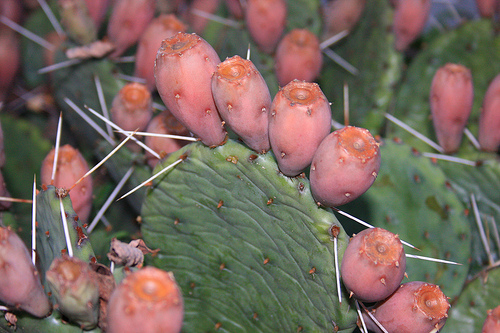
Eastern prickly pear cactus, Opuntia humifusa.
(*photo credit)
August 31, 2018 Support International Relief Groups
Within the last year we saw victims of earthquakes and of hurricanes Harvey, Irma, Jose and Maria -- and more expected this year. It is hard enough to respond to urgent needs at home, but often the need is even greater in distant lands. What about the victims of droughts in Africa and wars in the Middle East, or of cleansing of Moslem minorities in Burma. Instant communications make us all the more aware of suffering brothers and sisters in all parts of the world. Recall that two hundred years ago it took weeks to hear news from the other side of the planet. Our increased awareness should be balanced by quick governmental response and assistance, something that takes more than what individuals can do. Relief organizations are crucial, and thus our support of them should be commensurate to relief demands.
In December 2004, rapid reporting of a major tsunami allowed agencies to mobilize relief efforts for victims in Indonesia, Thailand, Sri Lanka, and other nations bordering the Indian Ocean. Over two hundred thousand people died in the tragic event; the worldwide response was rapid, but the assistance was later reported to have been maldistributed in some regions. It became evident in reviewing the entire episode that the global alert system could be improved, and this could have allowed many more people to retreat from the path of that major tsunami. When this was being written two islands in the Pacific were being evacuated due to impending possible volcano eruptions.
Relief agencies as well as alert systems could be improved, and emergency supplies stored in or near vulnerable regions such as at the drought-prone Horn of Africa. A wide assortment of agencies assist on a more routine basis in relief for refugees, orphans, and victims of past disasters. Besides private donations a governmental program of relief should be enhanced and not cut in support at this critical period of climate change.
Though I admire a variety of groups that are non- sectarian or specific in their charity such as Oxfam, the UN Childrens' Relief Fund, and Catholic Relief Service, still I have a favorite, which is more concerned about long-term relief and development, the Catholic Near East Welfare Association (CNEWA). This organization assists all Christian groups in the Middle East, from Ethiopia to as far away as India in long-term relief and development projects. What I like about CNEWA is that it quietly gives assistance to clergy training and parish development among those who are non-Catholic Christians (Coptic and Armenian Oriental, Syrian and other Orthodox, Church of the East, etc.) as well as to oriental Catholic groups. CNEWA assists in educational projects, irrigation work, and small-scale business start-ups among poor people with no other opportunities for help. The CNEWA periodical, "One," has excellent articles. Please visit their site: <www.cnewa.org>.
Prayer: Lord, make us global in our compassion, and help us assist others whether in immediate or longer-term need.
|